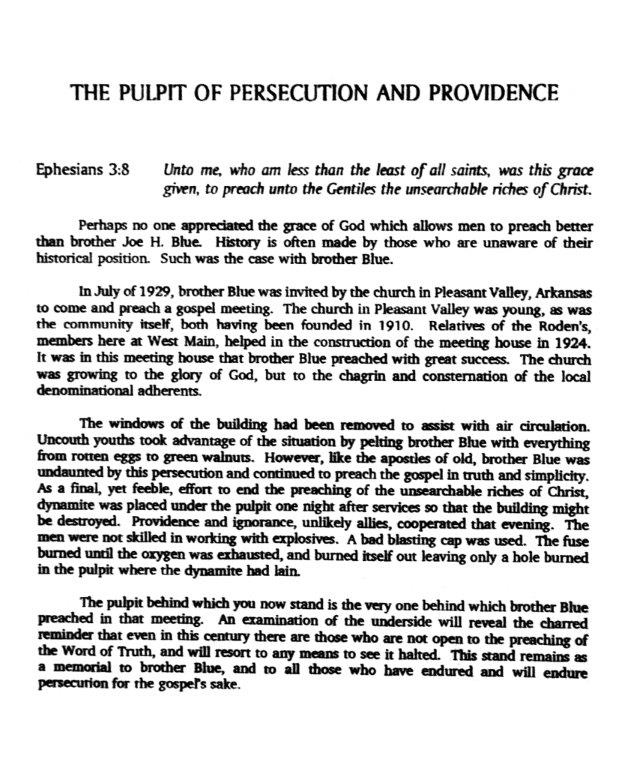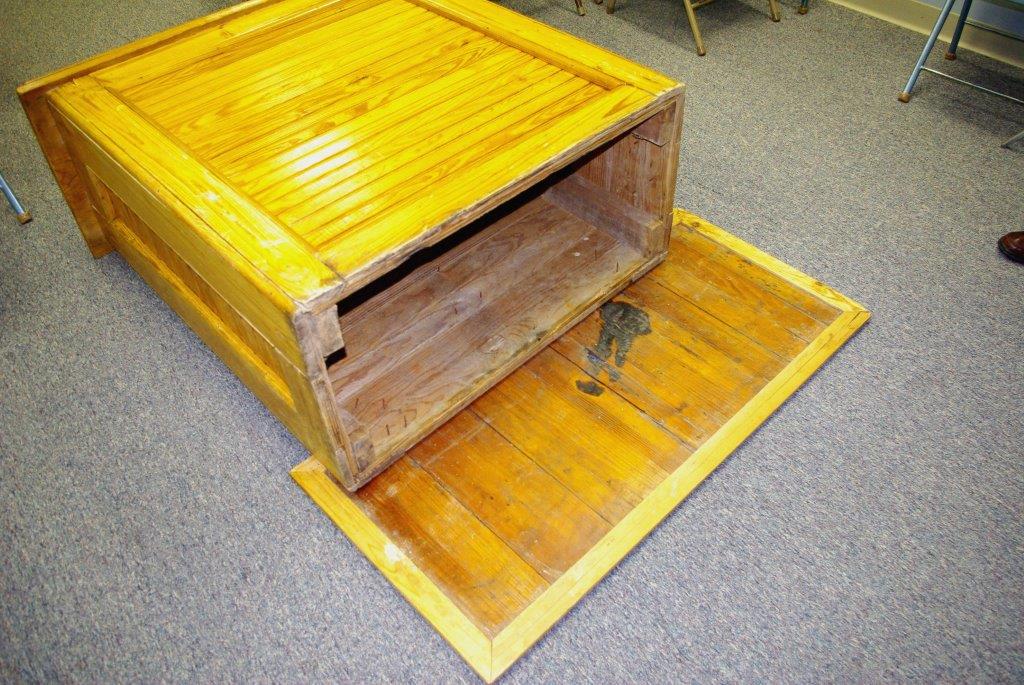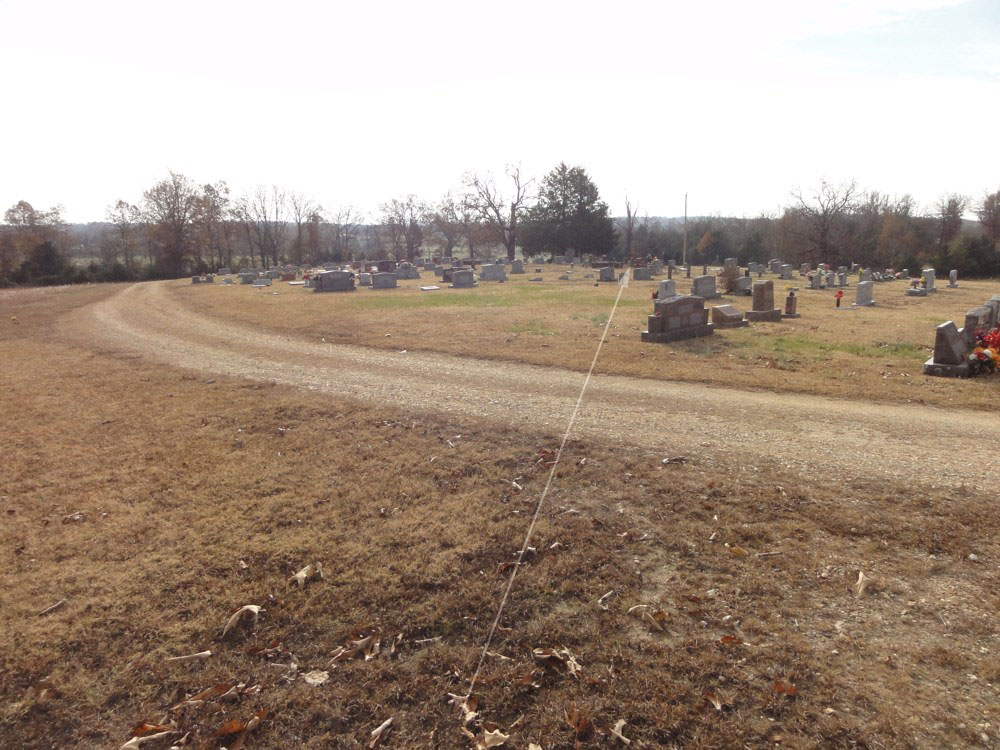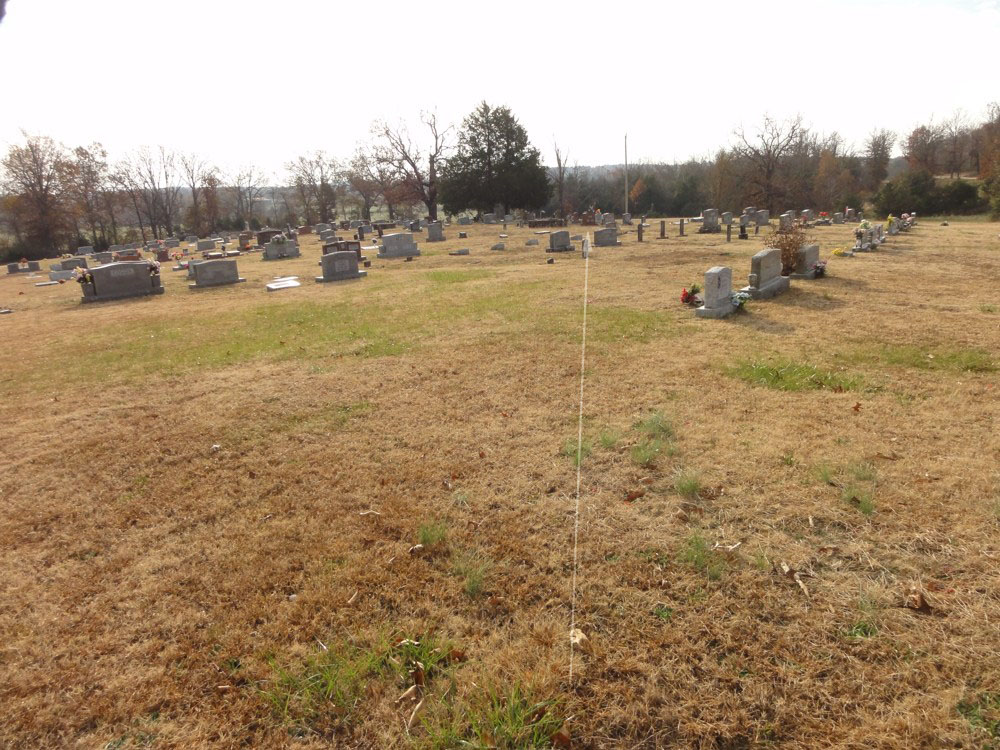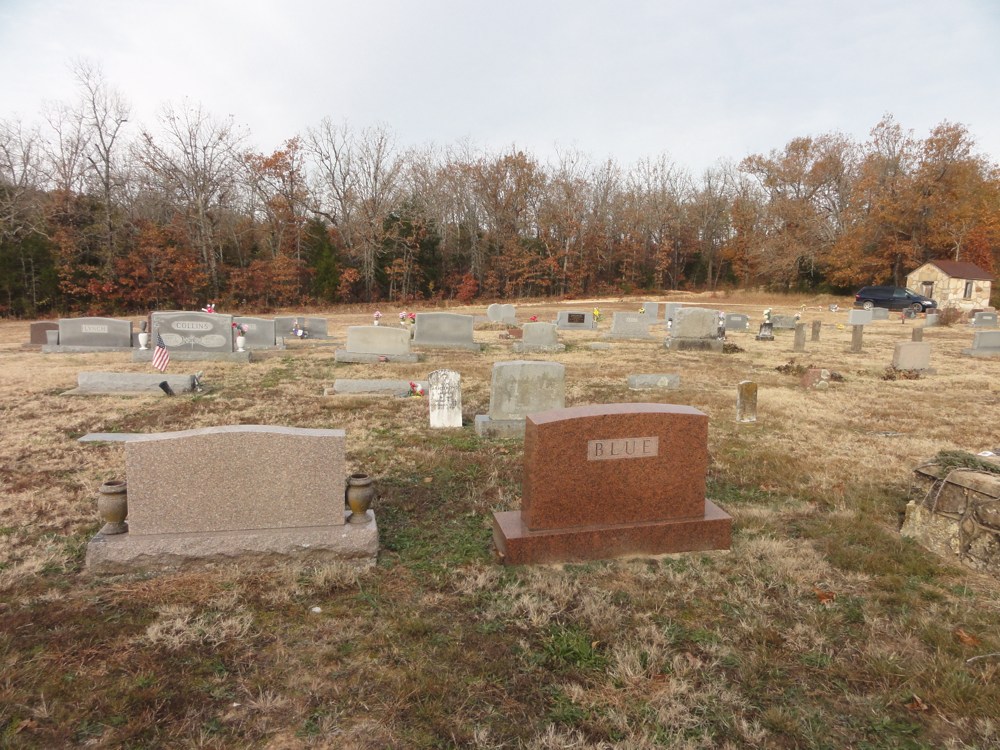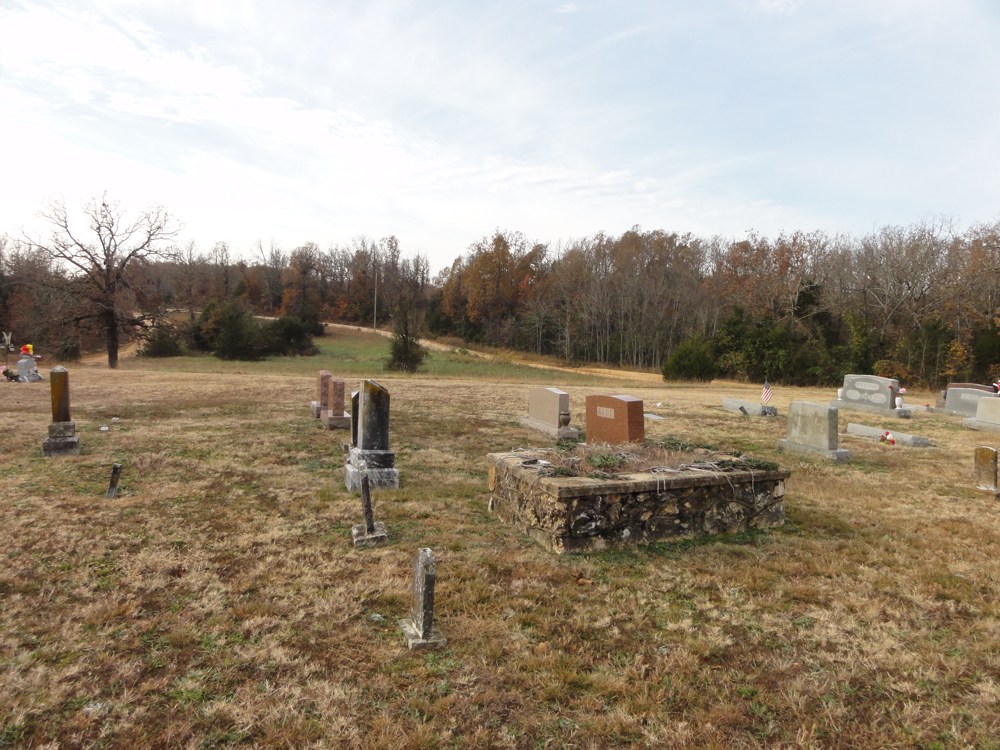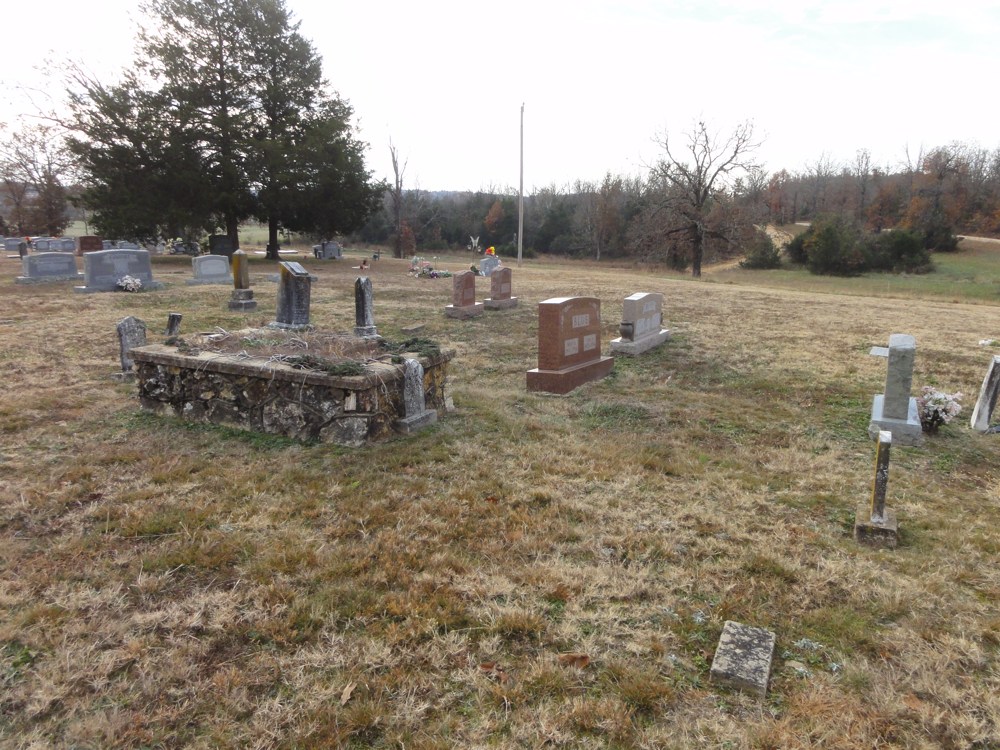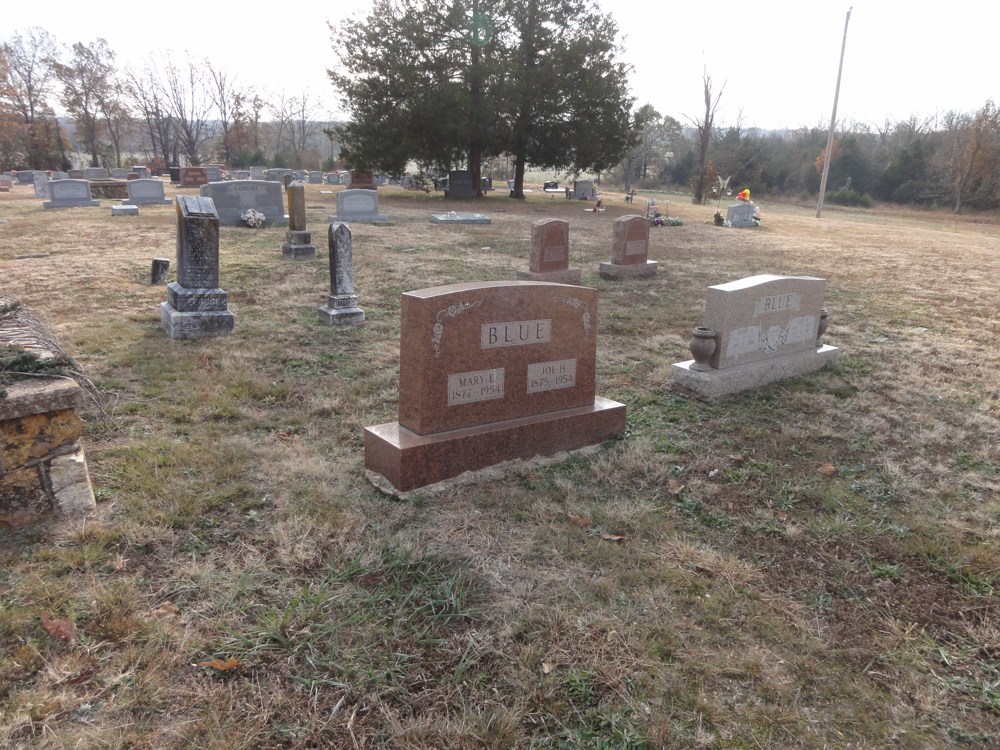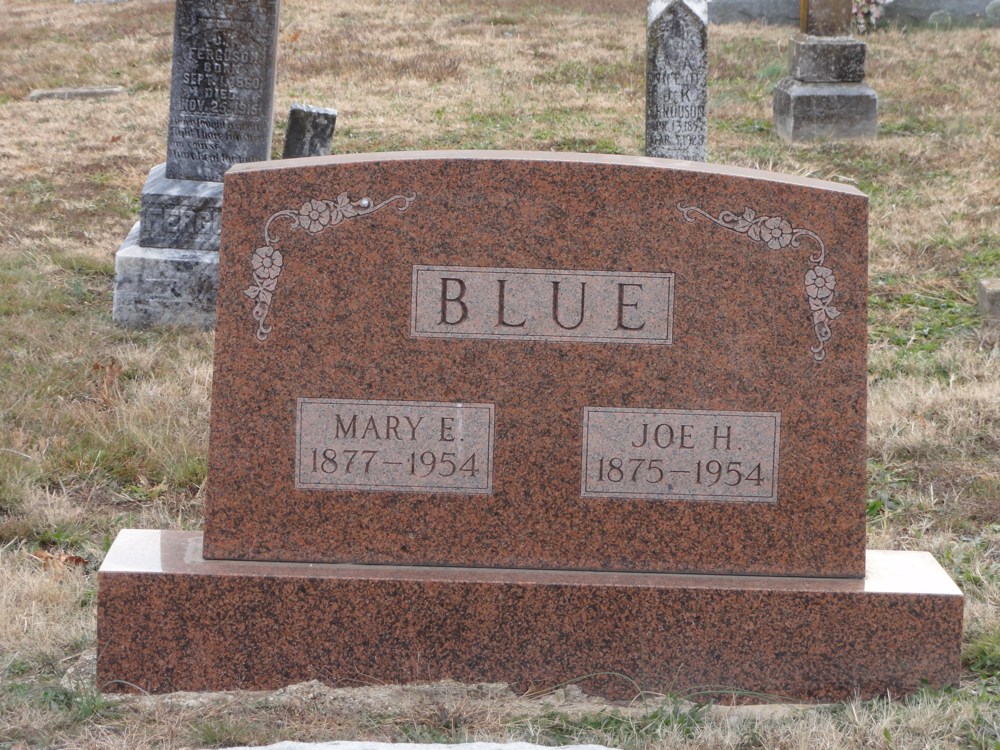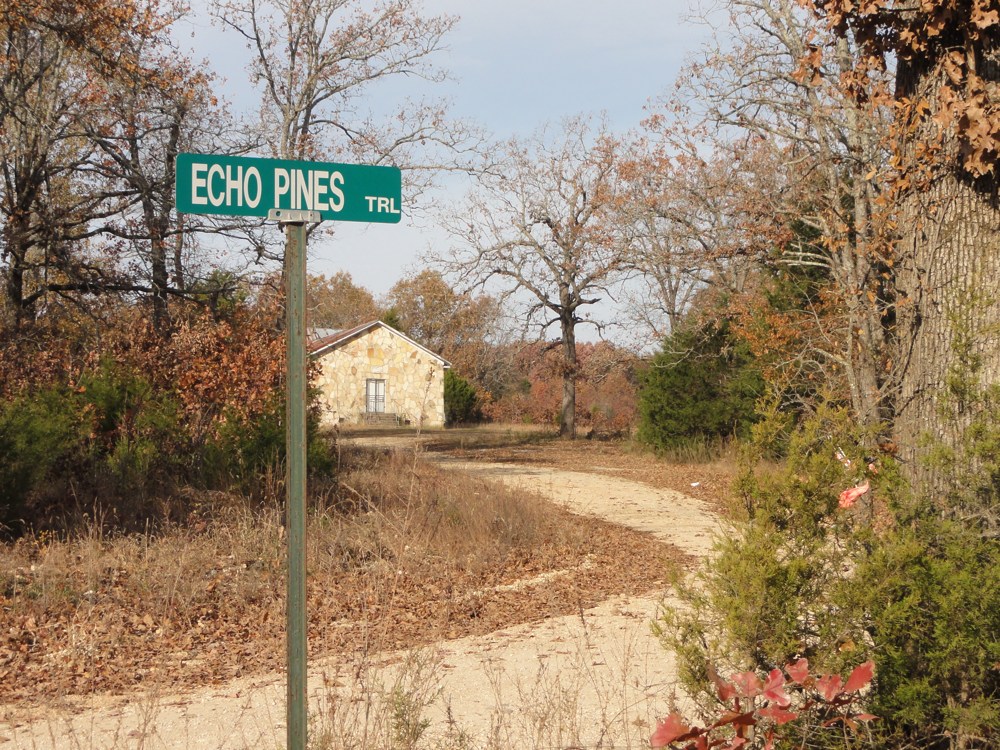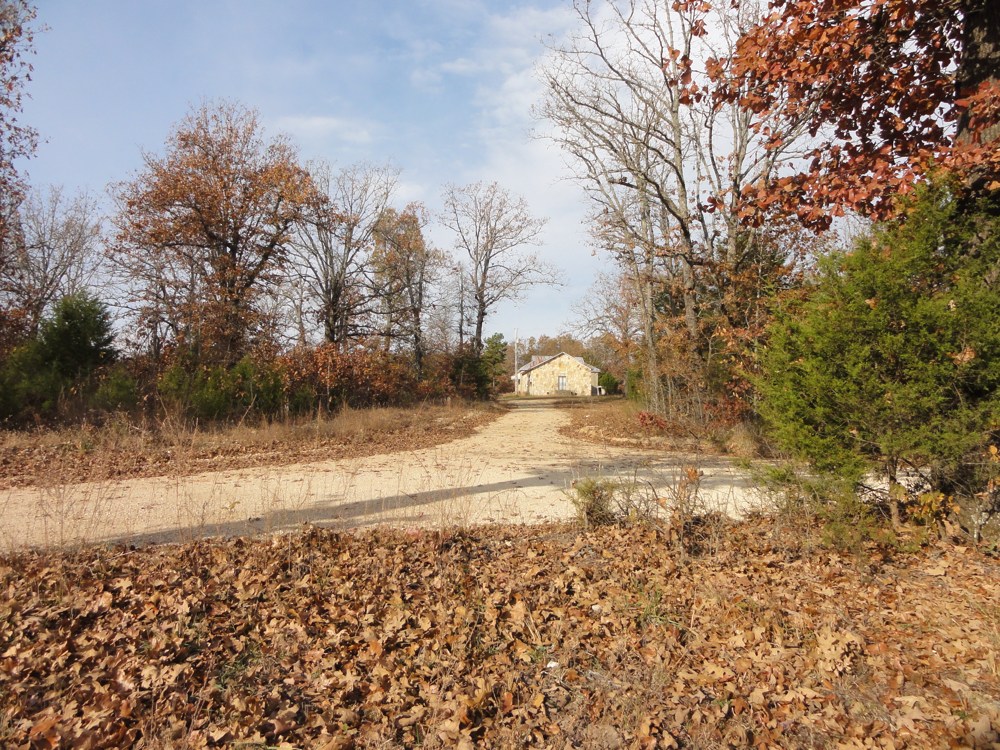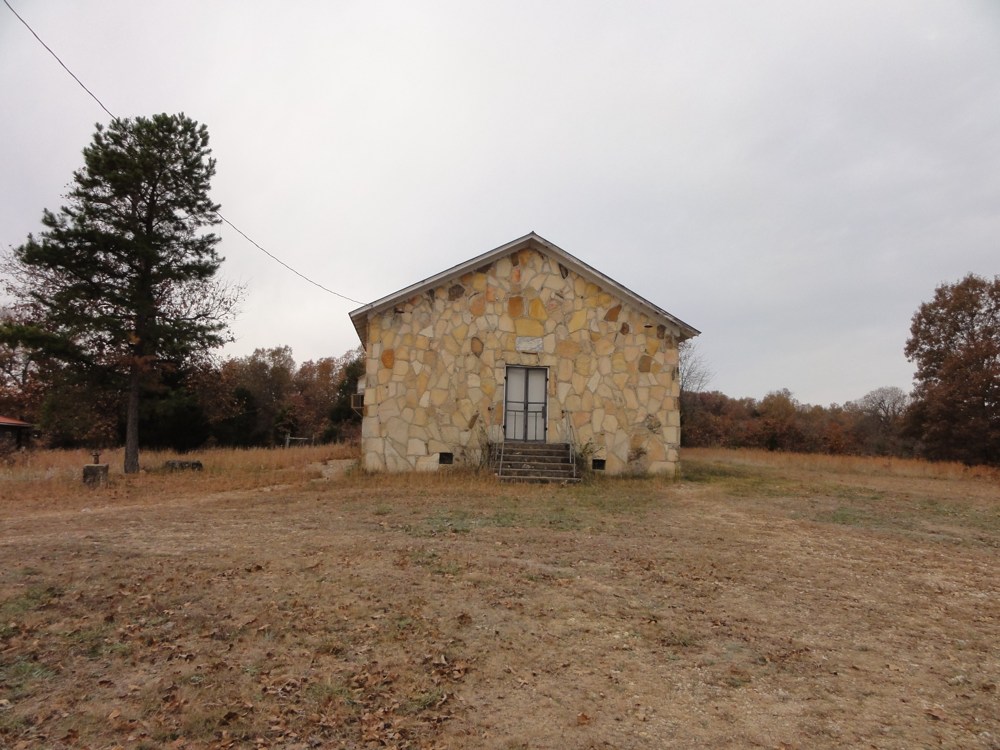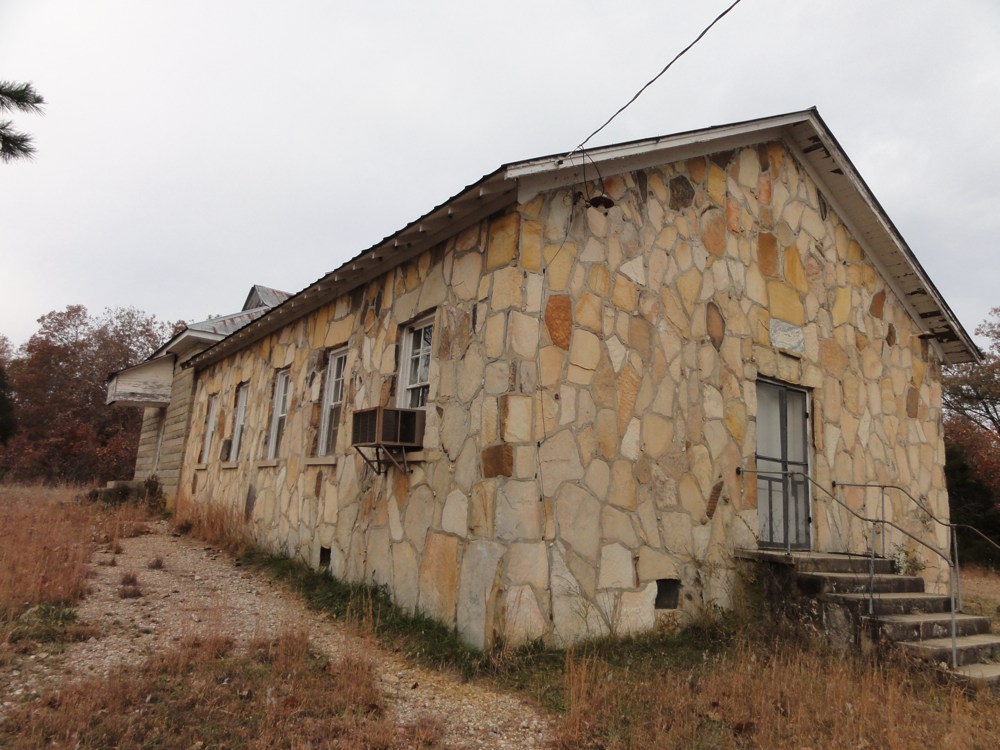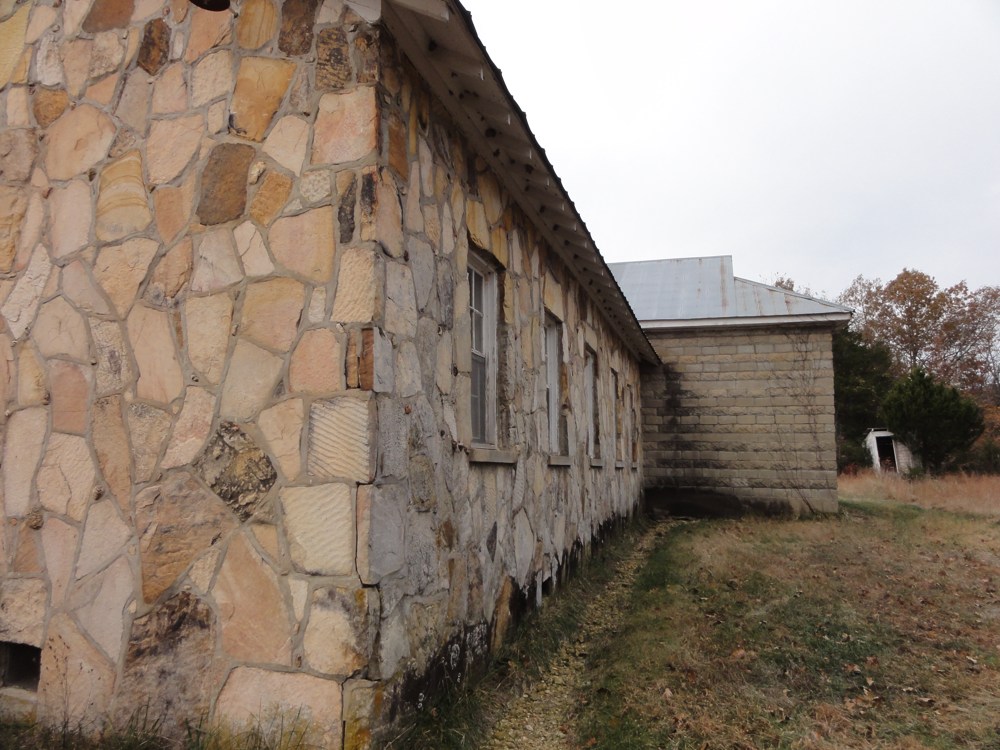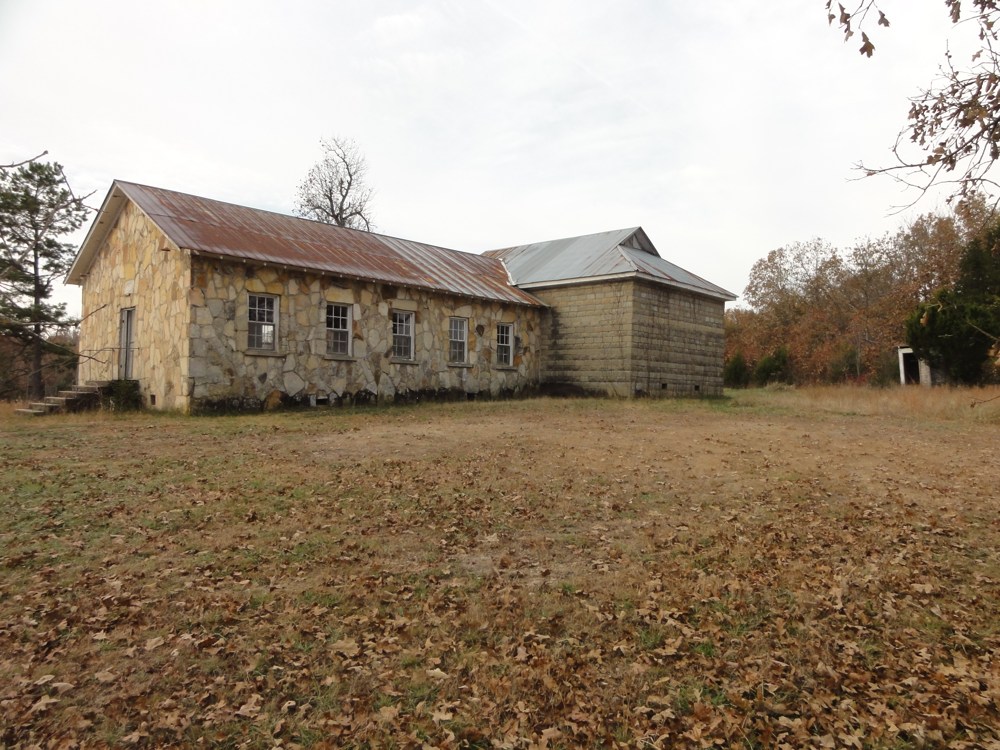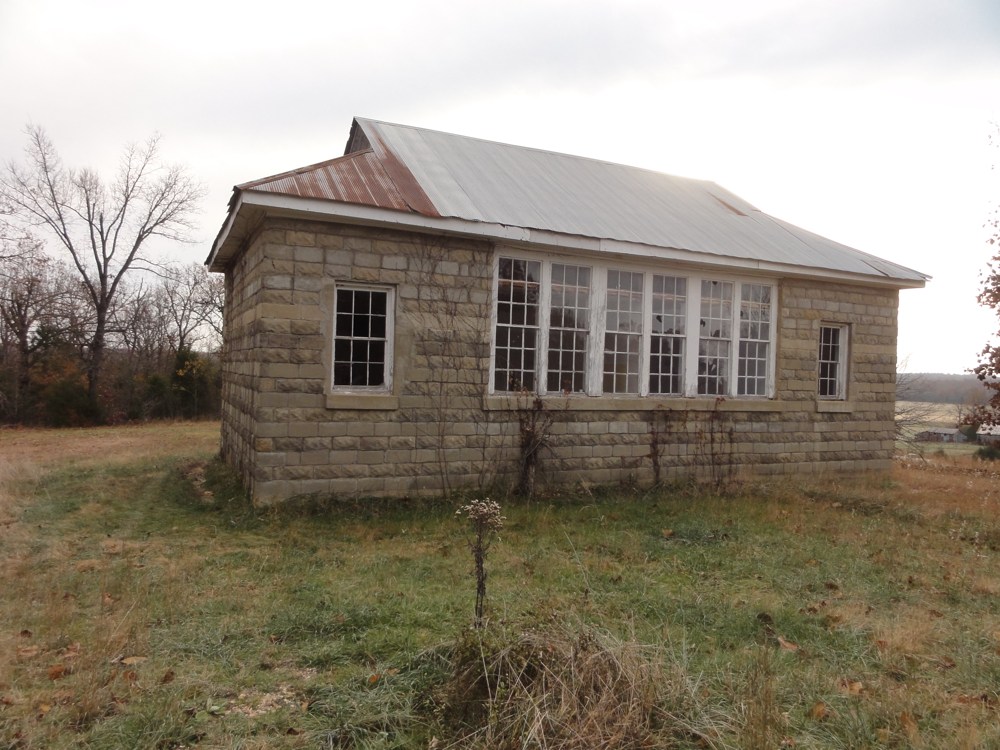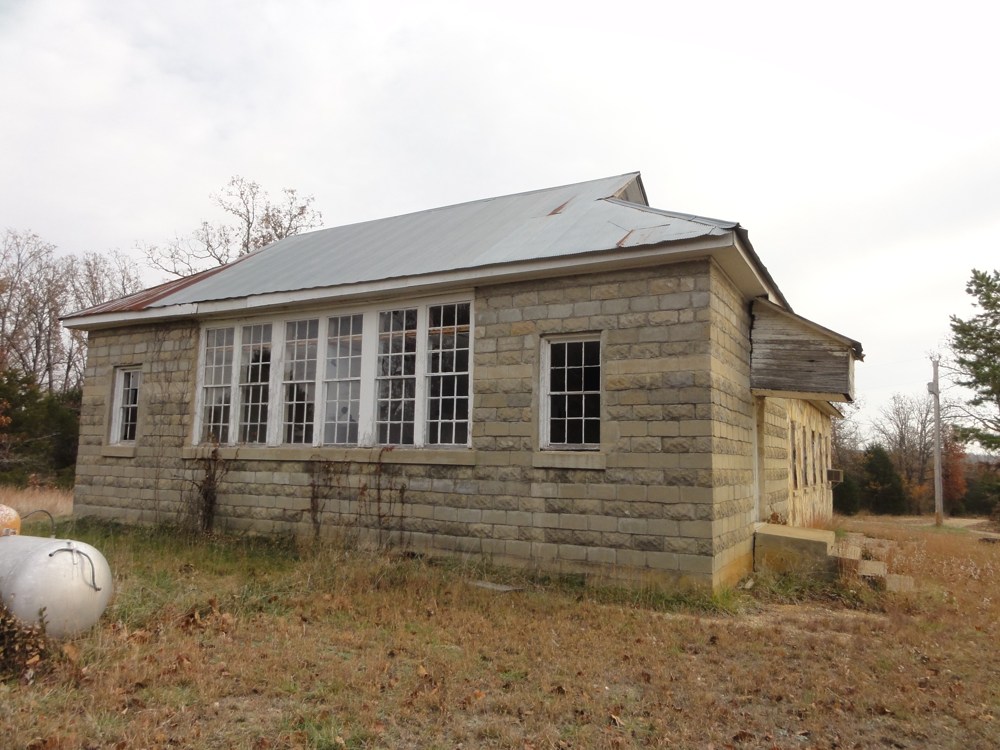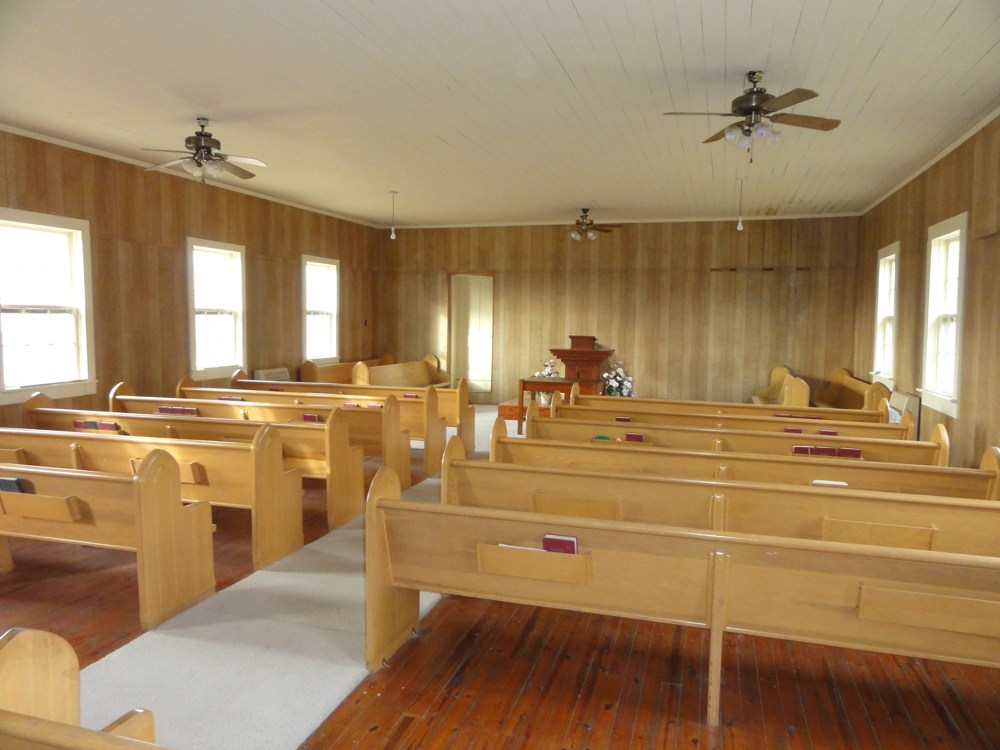Joe Hubert Blue
1875-1954
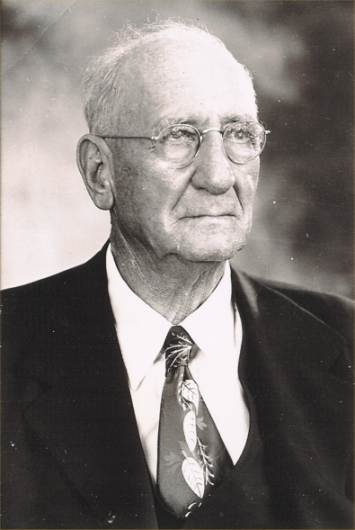
Autobiographical Sketch
Sketch By Franklin T. Puckett
Letter To Boyd E. Morgan
Letter From Joe Blue
Funeral Obituary
History Of Salem - Williams
How Converted - A Sermon By J.H. Blue
The Pulpit of Persecution And Providence
Location Of The Grave & Photos
Morriston Church, 1946
![]()
"I was born September 18, 1875 in Izard County, Arkansas near Mt. Pleasant. The fall I was born my parents moved six miles southeast near where Cushman is now, in Independence County on a farm. We lived there until the day I was eleven years old, and then we moved into Fulton County near Salem, Arkansas. My father, bought 220 acres of land in the woods, and we went to clearing and fencing it with rails.
There were twelve of us children-seven boys and five girls. We attended the neighborhood schools which were about four months in the year. My father was a gospel preacher, but did not preach very much. He said he had to stay with us boys to keep us out of the pen. I obeyed the gospel of Christ when I was sixteen years old under the preaching of the lamented W. A. Schultz, but was baptized by J. M. Billingsley. I attended worship at home, and read my Bible every day.
When I was eighteen years old I attended a ten months school at Agnos, Arkansas taught by W. R. Chestnut, and while there in school I worshipped with the congregation at Agnos, and there I received many good lessons from the brethren which have been a great help to me all the way through life. The fall I was 19 years old I traded a long-legged mule for a year's schooling at Viola, Arkansas. My father thought I made a bad trade, and said that I had lost a good mule. I was under the great teacher E.M. Perkins who died at Enid, a few years ago. I just had a change of clothes, and that was all.
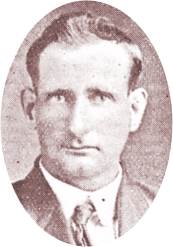
The year I was twenty years old I entered school at Salem, Arkansas under Professor J.H. Caldwell, I boarded at home, and rode horseback to my school.
When the school was out, I began traveling with Brothers Willie H. George and S.C. Garner. I owned a mare and saddle, and my father gave me a pair of saddle-pockets and a Bible. I just had one change of clothes and fifty cents in money. I left home crying on October 1, 1896, and rode thirty miles that day to join Brothers George and Garner who were in a meeting near Sage, Arkansas. They did the preaching, and I would read a chapter and lead in prayer, and that was as far as I would go in the work. All three of us went together from place to place on horseback holding meetings. The brethren would pay as much as $5.00 for a two weeks' meeting. The first money I received for my work was seventy-five cents. Brother Jack Warner, near Poughkeepsie, Arkansas, gave it to me, and that made me rich for a while.
On November 1, 1896, I preached my first sermon at Lebanon Schoolhouse near Poughkeepsie. I traveled with Brothers George and Garner until Christmas that year, and in that time I preached six times. I then started out by myself. I went into Sharp County and preached out in the sticks, in homes and schoolhouses. I had in my saddle-pockets the same change of clothes, my Bible, the Gospel Plan of Salvation by T.W. Brents, and four cents in my pocket. I did not say a word to anyone about my poverty. I was afraid they would think I was preaching for money. I preached all that year (1897) and baptized 75 and established one congregation. The brethren paid me $19.00 for my work that year. In May of that year my father sent me $10.00 to buy me a suit of clothes. I bought them with the $10.00, and then I was in fine shape for the work. Many days I went without dinner because I did not have the money to buy it.
In the fall of 1897 (November 9) I was married to Miss Mary Montgomery, and that was the best trade I ever made. She had a mare and sidesaddle, one cow, one sheep, and $25.15. We set up to keep house, and I must say that no one with all their fine houses was as happy as we were. Mary said she would cross the mountain by my side. I made a crop in 1898, and I fed my team night and morning in the dark. I would plow as long as I could see at night, and by sunup or before I was at my plow. Mary was with me with a hoe, and we made a fine crop. We settled down in the neighborhood where Mary was raised and have been here ever since. I have never moved. I preached every Sunday and Sunday night while I was making my crop that first year.
When we were married we had six members of the Church of Christ in the neighborhood. In the same neighborhood we had a Baptist Church, Methodist Church, Holiness, and Presbyterians, but today we have only the church in the neighborhood, and there has not been a sectarian sermon preached in the neighborhood in 35 years.
I made four crops after we were married, and the rest of the time I have been doing evangelistic work. We have remained on the farm all the time. We have our orchard, garden, cows, hens, hogs, horses, and goats. We have been married 46 years, and Mary has made two trips with me for meetings. She has been busy on the farm caring for the children, stock, garden, and chickens. We have bought 25 pounds of meat in the 46 years. We have never bought any butter, laundry soap, or vegetables of any kind. We never did buy any wood. We have raised three children, two of our own, and an orphan girl. I have conducted 107 debates. I have one of the best collections of religious books in the state.
I have never been the man to complain about what the brethren have paid me for my work. I preached monthly (for a year) for a congregation and held their meeting, and they paid me 14.00 for my work. I preached monthly for another congregation, twenty miles away, and held their meeting, and they paid me one dollar and a bushel of seed corn. Brother O. L. Hays and I were called to Cotter, Arkansas to hold a meeting in 1904 in the month of January, and they paid us $7.00 and a handkerchief apiece. When the meeting closed there was a three-inch snow on the ground, and we walked home a distance of 46 miles. I have gotten off the train at Hardy, Arkansas, in the night, and taken my suitcase and walked home that night, a distance of 25 miles. Many times I have set up in a cold depot all night, because I did not have the price of a bed and enough to take me on to my meeting. I have done without something to eat in my travels just because I did not have money to buy it and get on to meeting.
Mary is the bridge that has taken me over. She has never said not go, come home, or complained in the least. She has always said, "you go and preach, and do all the good you can, and I will take care of things at home," and she has done a fine job of it.
I have been stoned, beaten with green walnuts, and with eggs. I have had dynamite put under the pulpit while I was preaching. I have had to be guarded while I preached. I have had them to threaten to take me out of the pulpit and fix me so I would never be able to get in another one. I have had them threaten to hang me. I have suffered all this for the cause of our Lord, and yet have not begun to suffer what our Lord suffered, or the apostles.
I am now 68 years old and want to preach many more years. To God be all the glory for the great Victory. "
The above was written to me, Roy L. Ruckman, in January of 1944 in answer to a suggestion that Brother Blue write a record of his life and work for the benefit of some of us younger preachers who have never had to make so great a sacrifice. He had no thought of it being more than a personal letter. Along with some others who read and found it very inspiring, I felt that all who love the cause would like to read it. I mimeographed it and over 500 copies were distributed in connection with Brother Blue's meeting here in March (Sayre, Oklahoma).
Brother Blue had been known to me only by report, but the two weeks he spent with us (staying in my home) endeared him to us greatly. His memory is still almost unbelievable. His wit is keen, and except for the toll of the years of hard service he is still going strong. He is very active for a man of his years, and few would think him 68. His love for his home is excelled only by his love for the cause of Christ, and he still does not turn down calls for meetings when he is able to go. To know him is to love him, and all who know him hope that many more years may be his to spend in preaching the gospel of Christ.
![]()
The following was written during Bro. Blue's lifetime:
Nov. 1947
By Franklin T. Puckett
Veteran of Many Battles
Joe H. BlueJoe H. Blue, though not so widely known as some others, is one of the greatest men of his generation. For more than fifty years he has faithfully preached the gospel of Christ. Thousands have become Christians as a result of his labors. His name is a household word among members of the church throughout Arkansas, Missouri, and the Mid-west. He is a tower of strength to all who know him, and eternity alone will reveal the full extent of his influence for good.
Brother Blue was born in Izard County, Arkansas, near Mount Pleasant. He was one of a family of twelve children. Under the preaching of the late W. A. Schultz he obeyed the gospel, being baptized by Brother J. M. Billingsley. The story of his struggle to obtain an education is similar to that of many others who fought to overcome the difficulties of that period that they might gain greater knowledge and develop into better servants of mankind.
On November 1, 1896, Brother Blue preached his first sermon at Lebanon Schoolhouse, near Poughkeepsie, Arkansas. During 1897, he confined his labors to Sharp County Arkansas, preaching under brush arbors, in private homes, country schoolhouses, or any place where an audience could be obtained. Seventy five were baptized and one new congregation was established. His total remuneration for that year was nineteen dollars.
He certainly cannot be accused of becoming a preacher that he might have "an easy job with a fat salary." One year he preached monthly for a certain congregation, conducting also their summer meeting, and was paid only four dollars for his labors. For similar service rendered another congregation, he received one dollar and a bushel of seed corn. At the conclusion of one of his meetings, the brethren gave him a hound pup as a token of their gratitude. (He says it made a good dog.) Brethren of that day really believed the gospel was "free" and acted in keeping with their belief. In January, 1904, Brother Blue and Brother Oscar L. Hayes held a meeting at Cotter, Arkansas. When the meeting closed they were paid two dollars each and given a handkerchief apiece. They then had to walk a distance of forty five miles home through a three-inch snow. These are but a few instances of the sacrifices such men made to preach the gospel of Christ.
In preaching, Brother Blue does not spend his time rehashing the books of other men. To him "the Book" is the text to be used when proclaiming the gospel. A young preacher once wrote him asking to borrow some of his sermon outlines and stating that he had about run out of anything to preach. Brother Blue replied by sending him a New Testament and saying: "Son, all my sermon outlines are in this little book, and if You will study it diligently, thoughtfully, and prayerfully, you will have plenty to preach - the gospel."
He says he has never thought any man could beat the apostles of Jesus Christ as preachers, or expositors, of the will of God. When you sit in one of his audiences, you will hear the old Jerusalem gospel with an apostolic ring. His style is to recite one verse after another, each of which connects with those used before it. He sometimes uses as many as 150 passages of scripture in one discourse, all logically connected and rightly applied.
As a debater
Brother Blue belongs to the "Old Guard." With the exception of
C. R.
Nichol, he has held more debates than any gospel preacher now
living. In his debating, as in his preaching, he depends upon the
power of the gospel to destroy the strongholds of error, rather than
upon the use of rhetoric and oratory. Brother Rue Porter says he
once heard him in debate with W. E. Sherrill introduce seventy three
passages of scripture in one thirty-minute speech, and actually set
forth the argument found in each. This rapid and logical delivery of
the powerful word always struck the proponents of error with
devastating force. For example, several years ago he held a debate
with the Baptists at Grubbs, Arkansas, and after the debate closed
it was announced he would preach the next night at the church of
Christ. When the invitation song was sung that night twenty-two
Baptists came forward to be baptized in the name of Jesus Christ for
the remission of their sins.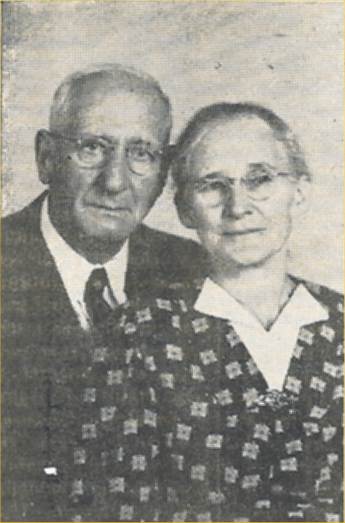
For nearly fifty years Brother Blue has lived in the Morriston community, near Salem, Arkansas. When he first settled there, only six members of the church could be found. Denominationalism was strongly entrenched, with Methodists, Baptists, Presbyterians, and Holiness being the leading factions. Today these churches are gone, and only the church of Christ remains. It meets for worship in a beautiful building of native stone located a short distance from Brother Blue's home. There has not been a sectarian sermon preached in that community in more than thirty five years.
It is only natural that a man like Joe Blue would arouse the enmity and stir up the hatred of creed-bound sectarians who love not the truth and close their eyes to ft. Their enmity has not always been manifested in a dignified manner. Brother Blue has been stoned, beaten with green walnuts; hit with rotten eggs, and on one occasion dynamite was placed under the pulpit where he was preaching. Through a kind providence the fuse went out before it reached the explosive. All kinds of abuse has been heaped upon him, but he rejoices that he has been "counted worthy to suffer shame for his name."
One of his closest friends says of him, "His friendliness, his anxiety about young preachers, his deep concern about the church in general and its growth, are characteristics which have stood out far above any desire for personal advancement or honor. He has never sought places to preach, but has gone where the gospel is needed without regard for support or the future. . .I have never heard him utter an obscene word of any sort, or say a thing privately that would have been at all improper if spoken in the pulpit. He is absolutely clean in all his habits, and I am sure pure in heart and thought at all times. I love him as I love few men. He chastens with tenderness, never rebukes unless necessity demands it, and reproves with a sort of cutting kindness that makes it reach the heart rather than stir animosity. I fully believe he is a Christian in the fullest sense of that term."
This paper would not be complete without a word concerning his devoted companion who has shared his joys and sorrows and stayed home "by the stuff" while he was out in the hard places carrying on the fight against sin and error. Of her Brother Blue says: "Mary is the bridge that has carried me over the gap." During nearly a half century of married life, they have bought about twenty-five pounds of meat, and no butter, laundry soap, vegetables of any kind, or wood for fuel. Sister Blue is truly a devoted wife and mother. An orphan girl who was reared in the home as one of the family says: "Joe Blue is the best man I ever knew, and he is not half as good as Mary." Two children - a son and a daughter - have blessed their home. Both are faithful members of the church. Next November 9, the Lord willing, Brother and Sister Blue will celebrate their golden wedding anniversary. May they have many more pleasant years together with God's richest blessings attending them day by day.
- By FRANKLIN T. PUCKETT
back to top![]()
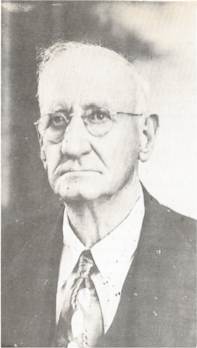 In 1952, I moved
to Mammoth Spring, Arkansas.
No lectureships had been held in that area and in 1953 I persuaded
the brethren to try one. They had agreed provided I arrange for five
preachers who would come for $10.00 each. Bro. Blue lived thirty
miles away. I wrote him and requested that he be one of the
preachers and suggested that even though he would be paid only
$10.00 that we nevertheless, would expect a $100.00 sermon. Typical
Joe Blue humor is demonstrated in his reply. The letter, which I
still have, is here given.
In 1952, I moved
to Mammoth Spring, Arkansas.
No lectureships had been held in that area and in 1953 I persuaded
the brethren to try one. They had agreed provided I arrange for five
preachers who would come for $10.00 each. Bro. Blue lived thirty
miles away. I wrote him and requested that he be one of the
preachers and suggested that even though he would be paid only
$10.00 that we nevertheless, would expect a $100.00 sermon. Typical
Joe Blue humor is demonstrated in his reply. The letter, which I
still have, is here given.
Salem,
Arkansas
March 27, 1953
Dear Bro. Morgan:
Your letter came to me yesterday afternoon. Many thanks. I am always glad to get a word from Boyd. The Lord willing, I shall be with you brethren April 24, 1953. I hope the lectureship will be good. I note what you wrote about paying me $10.00 for a $100.00 sermon. That is too great a sacrifice for an old worn out preacher to make. I have different prices on sermons. I have one I can let you have for $12.35 and one for $15.00, then I have one $25.00 sermon. I also have one for $7.89. I have another very nice one for $3.69. I am closing out on one you can have for seventeen cents plus tax. All in all I think you need about a $2.40 sermon, but when you go into $100.00 sermons it takes lots of rousement. We are very poorly. Mary has been very poorly for the last two weeks. I fear I will not be able to make our little garden. Cleo was here last week. I had a letter last Monday from Bro. W.A. Hall of Bay. He is now at Hot Springs taking baths. He is in a serious condition. I fear he will not live long.
Yours in the One Way,
Joe H. Blue
Brother Blue never preached the sermon. Mary's illness progressed until he felt he could not leave her and it finally consummated in her death. He did not leave her until she was taken away. Afterwards, Bro. Blue preached on various appointments and was in a meeting at Lynn, Arkansas only about six months after Mary' s death when he too was stricken with fatal illness.
![]()
Letter From Joe Blue To The Christian Worker
Morriston, Arkansas, August 1, [1929]. I began a meeting at Pleasant Valley, near Greenway, Arkansas July 13th, and preached there two weeks. Crowds in the church house were small, but on the outside of the house crowds were large, and very noisy, I baptized one very fine young lady. I have been preaching almost thirty-three years. I have been in the north, east, south, west, and the central states. I have stayed with the rich, and poor, I have stayed with the good and bad. I have stayed with the clean and the unclean, but there were more pure hard down mean prejudice to the square inch at Pleasant Valley and around there, than any place I ever visited. They have some as fine people there as I ever saw. The brethren and their families are very fine, and are working hard to build up a church. They started in a meeting just across the road from us, and preached three times and quit. They then tried to blow us up. They put a stick of dynamite under the pulpit. It blew the top of the pulpit off, and broke a plank in the floor, and burnt a place in the floor.
I then had a two hours’ debate with R. E. Black, who is a digressive. We had a very large crowd in the house that time. Black told me after we closed that he was whipped, and he told the brethren before we dismissed, that he wanted them to go ahead, and worship just like they had been worshipping (that is without the organ).
I preached the night following the debate and when I had been preaching about half an hour there came a shower of green walnuts, and eggs. I have had both of them thrown at me in my life but that was the first time I ever had walnuts and eggs mixed. After the shower I went on with my sermon. The same crowd threw eggs at Brother Stanley Jones about four years ago. That place reminds me of a place I visited thirty-two years ago on Strawberry River. The boys would stone the church house while I was preaching. They had broken all the windows [and] lights out of the house. I went over, and took supper one evening with a family, and after supper one of the boys, and I were walking over to the church, and I remarked to the boy, "that the boys were very wild in that country,” and he said, "Yes, I never did ‘cut up’ at church, well I did throw a cat on a preacher one night while he was preaching.”
I am now at Bay, Arkansas in a meeting. We are having good crowds, and fine singing. The preaching is causing some talk over town. I shall begin my next meeting at Walnut Ridge, Arkansas the second Sunday in August, and from there I go to Antioch, near Charlotte, Arkansas. The Antioch meeting will begin the first Sunday in September. JOE H. BLUE.
Letter From Brother Blue, Christian Worker, Vol. 15, No. 26 (August 15, 1929): 7, (Contributed by Terry J. Gardner - 3.2010)
![]()
Funeral Obituary
The following is the obituary used at Bro. Blue's Memorial Service:
Joe Hubert Blue
Joe Hubert Blue was born near Mount Pleasant, Ark, Sept. 18, 1875 and departed this life at Batesville, Ark. September, 1954 at the age of 79 years lacking a few days.
Upon Nov. 9, 1897 he was married to Mary E. Montgomery. To this union were born three children. One daughter, Mattie Florence, died at an early date.
He is survived by one daughter, Mrs. Myrtle Hatman of Paragould, Arkansas and one son, Cleo N. Blue of Eldorado, Kansas. He also leaves the girl he reared, Mrs. Marie Lynch of Waterveliet, Michigan, who has lived with Brother and Sister Blue since early childhood.
There are five grandchildren and three great-grandchildren. He has two brothers living, Roby and Perry Blue and one sister; Mrs. Florence McCarty of Los Angeles, California.
Sister Blue departed this life April 23, 1954 only a little more than four months before Bro. Blue passed away. He lived and prayed that God would spare his life long enough for him to care for her in all the years of her affliction, who had been so faithful, loving, and sweet to him during their 57 years of married life. He often spoke of her saying, "Mary is the bridge that has taken me over."
Ever working together to save souls and to do good to mankind, she in the home and he in the pulpit, hand-in-hand they have accomplished much in the Kingdom of their Lord. No preacher of the gospel ever had a more faithful toiling companion than he.
They have lived on the same farm all their married life. Their home has been called the, "Preachers Home," because their doors were always open with a welcome to any gospel preacher and they have cared for many.
Brother Blue was baptized at the age of 16 by Brother J. E. M. Billingsley and when he was 21 he began preaching the gospel of Christ and continued until the time of his death, which was 58 years of hard labor that he loved. He has baptized thousands of people and has conducted approximately 870 meetings and has held more than 100 debates. His favorite saying was, "You shall know the truth and the truth shall make you free".
The two daughters are strong faithful devoted Christians following in the footsteps of their blessed mother; while the father's mantle has fallen on his only son who is an able preacher of the gospel. The son has always looked to his father for counsel and guidance.
Hundreds of Preachers have asked him for advice and for, "What does the Bible say?" He has been recognized as authority upon the teachings of the New Testament.
The voice of him who has preached Christ and him crucified for more than half of a century is now stilled, he rests from his labors,--but works shall live on and on.
![]()
History of Salem - By Vester Williams
Chapter XVII
His uniqueness Advertised Fulton County.
Joe H. Blue was unique in every way. His size, his speech, his movement, and his manner were unique. His uniqueness attracted attention wherever he went. In his later years he became so well known throughout Arkansas, Oklahoma, and Texas that there was scarcely a community in these states that there was not someone who had heard of Joe H. Blue and many had met personally. It was not unusual for people from Fulton County traveling through the Southwestern states to be asked whether they knew Joe Blue, when it was learned that they were from Fulton County.
Joe H. Blue was loyal to Fulton County and her people. He always had a word of praise for the beauty of the county and for the fertility of the creek-bottom farms. He liked to tell the world that one had little use for a lock for the crib door in Fulton County. It was rare that anything was ever stolen because the people were almost a hundred per cent honest in his home county.
Joe H. Blue was what one might call a very plain spoken man. Many people thought him to be vituperative. His method of speaking for his church and the doctrine that he believed caused many to disapprove of his methods and to question his motives for using such biting language in the pulpit. But Mr. Blue believed that much error was being taught and practiced by the churches, and that it would not be noticed by the majority of people unless someone let go with something strong enough to awake them from their lethargy. He believed that if people became angry at his preaching that they would start searching their Bibles for the truth and in this way, he would succeed in winning them to his cause.
In many respects Mr. Blue was correct in his estimation of the results of his methods. The writer has heard numerous contemporaries of Mr. Blue remark, "I don't have any use for Campbellism but I will say one thing; Joe Blue has caused more Bible reading to be done in this community than anything that has ever happened before." Joe H. Blue's influence in establishing and maintaining "New Testament Church" (Church of Christ) in Fulton County has made a deposit of influence that will be drawn upon for many many years to come.
If Joe H. Blue had conducted his evangelistic work under the same methods as the present day big time evangelist does, he would have probably baptized a hundred thousand people during the 58 years of his ministry, because he would have had hundreds of helpers from many churches to advertise, to invite people to the services and newspapers and radio to reach out and influence people to come. He would have had large buildings in the larger cities in which to conduct services. He would have been among congregations reaching into the thousands instead of the ten to fifteen he had many times when he went to help try to establish a congregation in some community in a remote locality.
Mr. Blue told this writer when he went to him for information about himself and his work that he had not been so much interested in numbers as such; as he had been about being certain that there would be a "New Testament Church" in every community in the nation in the near future.
As a neighbor and a community man, Joe H. Blue stood high. He was progressive and industrious. He stood for schools, roads, and all other things of a progressive nature. He learned many new methods and new things in his travel over the nation. He tried out many of them to learn how they would work in this county.
Now, for a brief sketch of the life and work of Joe H. Blue, we will offer the following: Joe H. Blue, one of twelve children of Mr. and Mrs. John G. Blue, was born at Mount Pleasant, Izard County, Arkansas, September 18, 1975, and moved with his parents to a farm near Wheeling, in Fulton County in 1886, when Joe was eleven years old. This was his home until November 9, 1897 when he was married to Miss Mary Montgomery at Morriston. From that time on Morriston was his home until his death September 4, 1954. His wife preceded him in death on April 23, 1954.
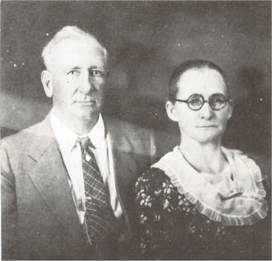 Joe and Mary Blue were the parents of three children, Cleo of
Kansas, Mrs. Myrtle Hatman Greer of Arizona, and one child that died
in infancy. Joe H. and Mary Blue raised one adopted daughter, now
Mrs. Arlie Lynch of Michigan.
Joe and Mary Blue were the parents of three children, Cleo of
Kansas, Mrs. Myrtle Hatman Greer of Arizona, and one child that died
in infancy. Joe H. and Mary Blue raised one adopted daughter, now
Mrs. Arlie Lynch of Michigan.
Mr. Blue's schooling consisted of attendance of the neighborhood schools until he was 18 years old. The year he was eighteen, he attended a ten month term of school at Agnos, taught by William H. Chesnut. The next year, Mr. Blue was in school at Viola for ten months under the tutorage of M.E.M. Perkins, and in his twentieth year, he attended school at Salem taught by J. H. Caldwell. This ended this schooling, but not his studying. He was a student until the day he died.
At the age of sixteen years, Mr. Blue obeyed the Gospel of Christ and was baptized by Elder J.E.M. Billingsley and from that date until his death, he was a loyal and faithful member of the Church of Christ. He attended worship on Sundays and read his Bible every day.
The summer Mr. Blue was 21 the Flint Hill District, about five miles from his home, at $22.50 per month. He stayed at home and rode horse back to school each day. When the school was out, Mr. Blue began traveling with Elders Willie H. George and S. C. Garner, helping them with meetings they were conducting in Sharp, Izard, and Independence counties. At first Mr. Blue did not do much except to read a chapter in the Bible, but on November 1, 1896, he preached his first sermon at the Lebanon schoolhouse near Poughkeepsie, Ark. He preached his last sermon at Lynn Arkansas in the last week of August of 1954.
Elder Joe H. Blue engaged in evangelistic work for his church for 58 years. He traveled extensively and. constantly. His Parish extended from Michigan on the north to Florida on the south, and from Indiana and Tennessee on the east to California on the west.
In relating some of his experiences, he said that he had been hungry many many times in his travels, because he did not have money enough to pay his fare to his next appointment and buy food while in travel. He also said that he had spent many nights in a cold depot because he did not have the price of a bed. In his younger days, he would arrive at Hardy on a midnight train and walk and carry two heavy suit cases to his home 25 miles away because he did not have the money to pay someone to drive him home. Money was not the only trouble he had; he was hit with walnuts, eggs and rocks. He was threatened with death if he did not get out of the community. Dynamite was put under his pulpit. Officers of the law have had to guard him while he preached, but none of these things stopped him from doing what he believed to be his duty to his church and to his God. Mr. Blue was proud of his record. He could look back over a life time of service to the church. He had preached thousands of sermons, conducted hundreds of funerals, engaged in 107 religious debates and baptized approximately ten thousand people.
![]()
Salem Highlight Article
--Taken from a January, 1961 issue of the Salem Highlight.
A Champion of Champions. I do not remember the first time I saw Bro. Joe H. Blue. His name was and still is a household word. The hours spent in his company are treasured hours. Because vital statistics elsewhere follow I shall try to relate a few other things about him.
Joe H. Blue was a large man, not fat, not slim, just a big man. He stood well above six feet in height and I would guess his weight at 220 lbs. His presence denoted solidarity. He spoke without the slightest doubt of what he said. He preached the Bible. He loved the Bible.. He knew the Bible. Above all he believed every word of it. I know that he did. When he spoke, the hearer had the impression that he knew all he needed to know to speak with authority on the subject. Few men could say a thing with equal force to Joe H. Blue.
He was holding a meeting in Walnut Ridge in August 1929 when I was baptized. He baptized me in Clear Lake, near Portia. He later heard I was preaching. In 1941 I received my first correspondence from him. He desired me to book a meeting at his home congregation, Morriston in 1943. I answered, accepting and asked if he remembered that he was the one who baptized me several years ago. I got a card right back saying, Yes, I remember baptizing you 12 years ago and I remember your mother, too, and son, remember, the Bible is the best sermon book you can buy. You see, my mother thought I was young to be baptized and Bro. Blue intervened for me. She was sincerely concerned and Bro. Blue questioned me and advised that she not be concerned and allow me to obey the gospel. I count his advice on the sermon book the best advice I ever had.
A great conversationalist, he was most pleasant to have as a visitor in the home. He could entertain all day long with antedotes and real life experiences. I remember some he told when I was a child. Once he visited a home where he knew the little boy had been cautioned to death about behaving at the table while Bro. Blue was there. The boy was slicing his meat when his fork slipped and down went his meat toward the floor. The boy looked quickly at his mother, grinned and shyly said, Huh! You thought I dropped my meat didn't you, but I caught it on my toe.
Again, one little fellow saw a beautiful dish of cornbread and thinking it was cake said, Bro. Blue when I get my plate clean I want a piece of that cake. Bro. Blue smiled and only said, Alright. I've got my plate clean and am ready for that cake now. Here you are, son, Bro. Blue said as he helped the boy's plate. The boy took a bite, swallowed it, looked up at the preacher and said, Bro. Blue, this is good but I don't like it.
On another occasion one little boy just stood with his eye on Bro. Blue all the time, said nothing but wouldn't take his eye off him. This continued even when they went to the table. The boy's father called on Bro. Blue to express thanks. Bro. Blue did. When he raised up the boy threw back his head, laughed, and said, "Well, Crack-e-doodle."
All these tales Bro. Blue would tell to the delight of yours truly who was yet under 12 yrs. of age. He was a delight. Arch Lemmons told me he stayed at their house in a meeting at Hubble Creek when Arch was a boy. He told the children that up where he lived; they had three pieces of money that made a dollar. They were so amazed they kept asking him about it for a long time before they figured out it was a half dollar and two quarters.
Such was the clean humor of a great man who loved life and people. He would put just enough humor into his preaching that his sermons were never dry and people would travel for miles to hear him preach.
Beyond doubt he was the best known of Northeast Ark. preachers. He told me he had preached in 25 states. I have preached in 13 and I have preached where I would tell about our preachers and no one would know any of them except Joe Blue. I have never preached where he was unknown.
To stay in his home was a joy. I had that privilege in two meetings in 1943 and 1944. His wife Mary was truly as he said, the bridge that carried him over. I have heard him boast, I never bought a pound of meat or a pound of butter in my life, I never had my suit pressed in a shop, I've had them cleaned but Mary always pressed them. It was true. She was one of the finest women I ever knew. Only once during both meetings was I asked to go to the store to buy groceries and that was one loaf of bread. Once she asked me to take her eggs to Salem and bring her back some things. Not one item was requested but feed for stock. Her table was filled with the best of foods always. In addition to her own needs she canned around 500 jars of food for Southern Christian Home every year. She cared for the chickens, hogs, and cattle in Bro. Blue's absence. She told me she made two preaching trips with Bro. Blue after they married and told him, "Joe, you go right ahead preaching and I'll stay at home and take care of things. " She did, and not only home, but she saw to it that the little church at Morriston had what it needed. She baked the loaf and put up the wine for the Lord's table, and cared for the needs of the church as much as any woman could. When she took down with her last illness, Bro. Blue dropped everything and stayed with her until the end. Her death preceded his only a very few months.
Generous in nature, Bro. Joe H. Blue was a charter member of the Board of Trustees of Southern Christian Home from the time it started until his death. I have visited the sick with him, when he opened his pocketbook and left a ten dollar bill. Joe Ballenger wrote him that the church at Corning which met in the theater was building a house and could he get them some help. Bro. Blue sent a check saying, I didn't have any money, so I sold a sow and here's what it brought. He was a patriarch of all and many were the churches and individuals who called upon him for help.
The Joe Blue stories that people tell are many. I have tried here to tell what others did not. A volume could and should be dedicated to him alone. I once asked him why he didn't write a book of sermons or sermon outlines so we younger preachers would have them after he was gone. He said, "Bro. Morgan, every man needs to know his place and work there. I'm a debater, I'm not a writer." He said that the little story of his life was the only thing he ever wrote except reports for the papers.
Once years ago he conducted a meeting. The meeting closed on Sunday morning and Bro. Blue was to ride his horse home that afternoon. The usual speech was made about Bro. Blue being here during the meeting and working hard and if anybody had anything to give him, while they sang to come up and put it on the table. They gave him five dollars. One brother approached him and said, Bro. Blue I guess you noticed I didn't go up and put anything on the table, but you go home and eat dinner with me and I'll do as much for you as all the rest put together. Bro. Blue thought he needed to eat somewhere so accepted. After the meal the brother said, Now come with me and I'll show you what I'm going to do for you. He led him behind a hen house where a bird dog Gyp had a litter of puppies and said, Bro. Blue, these puppies are worth ten dollars apiece and here's what I'll do. You give me that five dollars they gave you and you can have one of these pups and I'll be doing as much for you as all of them together did. Bro. Blue allowed he didn't need a dog.
Mr. Freeda Belford of Reyno, Arkansas surprised the brethren there one day when he told one of the elders, Till Glasco, that since they wanted and needed a new church building to just go ahead and build it, do what they could and wished toward helping and send him the rest of the bills. It was a tremendous gift and especially so since he was not a member. When the church house was completed it was beautiful and the brethren were very proud. They called Bro. Blue and me to dedicate the building on a set Lord's Day. Bro. Blue preached the preceding Saturday night and the next day arrived with much expectation. I preached that morning and thought I did a fine job. I mean I thought I had fulfilled my task and met everybody's expectations. I praised Mr. Belford for his generosity and willingness to help the cause. We all ate dinner and Bro. Blue preached that afternoon. There was an overflow audience. Bro. Blue paid the expected compliments and then the bombshell came. "Now Freeda this is a wonderful thing you have done but I've got to tell you one thing. It's not going to do you one bit of good." There was a moment of silence, then he continued to preach a great sermon. He and Mr. Belford were very good friends and I am happy to say that later Mr. Belford obeyed the gospel of Christ. The building has been remodeled but still is in excellent condition.
During the last two years of his life I enjoyed intimate association with him. Even though heavily burdened with his own failing, health and the certainty that his beloved Mary was nearing the end he helped in raising the money to build the Viola Church house. The last sermon I heard him preach was at the Viola dedication service held the first Sunday in June 1954. The kind of preaching he did is rare today.
Undoubtedly Bro. Joe H. Blue was at the top of the list of our gospel preachers. He supported every good work, and aided every effort within his power and held the very highest reputation among those within and those without. His life and his work was a credit to the cause. I counted him at the top of the great ones.
I knew that he loved me, too. I have tried to tell just a few things that others did not tell.
-Most of this material came from Arkansas Angels, Boyd E. Morgan, College Bookstore & Press, Paragould, Arkansas, c.1967, pages 79-92. Some of the information, though also found in Arkansas Angels, some of the material was located in other places as well. Special thanks to Wilma Langston for Puckett article. See more below under Webmaster's Note.
![]()
A Sermon By Joe H. Blue
(Being the only recorded sermon by Joe H. Blue known to be in existence. Preached by request to a few brethren at Morriston, March 19, 1953. Recorded by Cleo Blue, son of the speaker. Joe H. Blue was born September 18, 1875, and passed from this life September 4, 1953.)
All religious people believe that individuals must be converted before they can become children of God. It isn't worthwhile to introduce an argument to prove that we must be converted because we all admit that -- it is a universal fact. But, when it comes to how we are converted, we are divided considerably along this line. Many people imagine that we are converted in some mysterious, miraculous way, separate and apart from the teachings of God's Word. And, they rely on this particular portion of scripture: Jesus said in John 6:44; "No man can come to me, except the Father which hath sent me draw him: and 1 will raise him up at the last day." They conclude from this quotation of scripture that God is going to draw individuals in some mysterious miraculous way. How anybody could ever get that idea from that quotation of scripture. I cannot tell you. I know it is foreign from the truth. Suppose I should make the statement that "God gives us bread" --- everybody admits that to be true, it is a universal fact. But the question is, "How does God give us bread?" There is not a mother's son who thinks God sends down the bread already prepared. But he gives us bread through means, that he gives the soil, the mind and strength to till the soil, the seed with the germ of life in it, refreshing showers and lovely sunshine. By using these means we receive bread. The same is true in regard to God converting the human family -- He does it with means. Without means God does nothing.
I want to read the remainder of this quotation of scripture: "No man can come to me, except the Father which hath sent me draw him: and I will raise him up at the last day. It is written in the prophets, "And they shall be all taught of God." In this quotation of scripture Jesus quotes from Jeremiah the 31st chapter beginning with the 31st verse, where Jeremiah prophesied that God was going to establish a kingdom and make a new covenant. And he said that every man should not teach his neighbor saying "Know the Lord" for they shall all know me from the least to the greatest. That was spoken some 600 years before Jesus Christ came into the world. And Jesus quotes that quotation of scripture and endorses it. Then they shall all be taught of God -- there is not a single exception to that rule. He didn't say a part of them should be taught. But "they shall all be taught." We might talk about this statement that Jeremiah makes. He declares that God is going to make a new covenant with the House of Israel and the House of Judah. It would not be according to the old covenant which He had made with their fathers when He brought them out of the land of Egypt. Then he goes on and declares, "Every man would not teach his neighbor and his brother saying, Know the Lord, for they shall all know me from the least to the greatest." Under the old covenant, the Jewish dispensation of time, they were born into Abraham's family, or purchased with his money, and then they were taught the Law. But under this new it is the reverse. You are first taught, and then you can become members of the institution. Now get that, and remember that's God's plan, and Jesus Christ endorses that. That is a universal rule. They should all be taught --- there is not a single exception to that rule.
Now I want to make this statement: There isn't a single instance where a person is converted in a mysterious, miraculous way. The Lord has this plan by which they can be converted. And without this, without their being taught, they cannot become children of God. Let us read from Matthew 13: 15: Jesus said, "For this people's heart is waxed gross, and their ears are dull of hearing, and their eyes they have closed; lest at any time they should see with their eyes, and hear with their ears, and understand with their heart, and be converted, and I should heal them." Now let's talk about this quotation of scripture, This people's heart is waxed gross or in other words become stupid, and they close their eyes, stop their ears, lest they should see with their eyes and hear with their ears and understand the word of truth, and then be converted. We see from this that the individual must see, hear, and understand the word of truth in order that they might become a child of God. Now let's read the text again: Jesus said, "They should all be taught of him ... "Of whom? Of God. Now get that thought. Everyone therefore that hears and learns of the Father comes unto Him. You must hear, you must learn of God's will concerning the human family, and then that person can become a child of God. Now listen and blend the three quotations together. First, they must all be taught. Second, they must see, hear, and understand the word of truth. And then that person can be converted, and that person can be pardoned.
I want to establish before you an inexorable law and prove to you that that is God's plan, and that God has never deviated from it, from the least in any respect. In the first place I might call your attention to this quotation of scripture: You know Paul says in Romans 1:16: " For I am not ashamed of the gospel of Christ, for it is the power of God unto salvation to everyone that believeth; to the Jew first, and also to the Greek." Now get this thought: The gospel is the power of God. It is not a power, but the power unto salvation to everyone that believes in it. The gospel is so great, so powerful, so important, that God wants it preached unto every creature under heaven. For that reason he said in Mark 16:15,16, "Go into all the world and preach the gospel to every creature. He that believeth and is baptized shall be saved, but he that believeth not shall be damned." Now you go and preach the gospel to every creature. Paul declares, as he recorded in Romans the 16th chapter and 23rd verse, "It is preached unto all nations for the obedience of faith." Why should the gospel be preached? To bring about the obedience of faith. And in every instance where people are converted they were first taught the truth or taught God's will concerning the human family. They learned it, they believed it, and then obeyed it, and became children of God.
I want to introduce some concrete examples now. I call your attention to the second chapter of the Acts of the Apostles, where the apostles received the Holy Spirit on the day of Pentecost. They were there at the city of Jerusalem. Jesus had told them to go there, tarry there, and not to even preach that Jesus Christ was the son of God until they received this power from on high. They received that power which set upon them and they began to speak as the Spirit of God gave them utterance. There were devout men there from every nation under heaven on that occasion. They assembled to attend an annual feast. The Holy Spirit came on them and they began to speak as the Spirit of God gave them utterance, and when this was noised abroad the people of this city wondered what it meant. Some of them said they were drunk. Others less serious mocked them, but Peter lifted up his voice and said, "These men are not drunken as ye suppose seeing it is but the third hour of the day. But this is that which was spoken of by the prophet Joel." Joel prophesied that He would pour out of His Spiro it on all flesh, and Peter declares this if the fulfillment of that prophesy.
These men had crucified the Son of God just a short time before this. Their hands were stained with the innocent blood of the Son of God. Peter began preaching, introducing prophecies that Jesus Christ was the Son of God. He fulfilled those prophecies to the very letter. He made arguments they couldn't refute, proving that He was the Son of God, and then he said, "Let all the house of Israel know assuredly that the same Jesus whom you crucified just 50 days ago, is now seated at the right hand of God and has shed forth that which you have now seen and heard." When they heard this they were pierced in the heart. Well, why were they pierced? They were Jews, they had lived under the Law of Moses for 1500 long years, and they had made sin offerings year by year continually. But those Jews all understood that when the Messiah made his appearance they could no longer make those sin offerings. So Peter convinced them that Jesus was the Christ. He convinced them that they has crucified the Son of God. He convinced them that he was now at the right hand of God and shed forth that which they had seen and heard. When they heard this they knew they couldn't make the sin offerings they had made previous to this time and so they were pierced in their heart and cried out to Peter and the rest of the apostles, "What shall we do?" Peter says, listen, "Repent and be baptized everyone of you in the name of Jesus Christ for the remission of your sins and ye shall receive the gift of the Holy Spirit." And the same day there was added to them about 3000 souls. How were they converted? Not in some mysterious, miraculous way. Just as Jesus said. They were first taught. And when they were taught what to do, they obeyed the same and became children of God and that is God's plan of converting the people on the day of Pentecost.
And now I call your attention to the 8th chapter of the Acts of the Apostles. They began to go out from this place quickly, and we find that Philip went to Samaria, a distance of about 60 miles from Jerusalem and we find he preached to them the things concerning the kingdom of God. To, preach things concerning the kingdom of God was to preach · that the kingdom of God was established. He preached to them the law that they must carry out to become children of God. And they believed those things, and were baptized both men and women. Believed what? Philip's preaching. But there is one thing I want to get before you now: That in preaching -- preaching means to teach -it doesn't mean to scream and yell and shout yourself hoarse, as some people think. But it means to teach, and he taught them things concerning the kingdom of God. When they believed these things then they were baptized both men and women. Well, it goes on to say that when Jerusalem heard that they had received the word of the Lord, they sent Peter and John up there to lay hands on them that they might receive the Holy Spirit. Why was this? To convince them that Philip had preached the truth. They didn't have the Bible compiled as we have it today. They couldn't pick up their Bible and turn and read as we can today. But they spoke as the Spirit of God gave them utterance. Now to confirm them in their faith Peter and John laid hands on them conferring gifts on them that they couldn't receive in any other way, and this convinced them that Philip had preached the truth beyond a doubt. But about the time this meeting closed, we find that the Lord spoke to Philip as recorded in the 8th chapter of the Acts of the Apostles, and commanded him to go down to the road that leads south, to the road that leads from Jerusalem to Gaza which was desert.
Let me drop this thought right now. There are many people that read that portion of scripture which says it was desert and they conclude it was a dry place where there was no water at all. But let me introduce this quotation of scripture: We find that Jesus according to the 6th chapter of John saying that he went into the desert. Well of course the place where this man was travelling was desert, but a great many Jews followed Jesus, and after teaching them the disciples said, "How can we feed this multitude?" "Shall we go into the city and buy food?" Jesus said, "No, they would faint before you would get back." There was a boy there who had some fish. I wonder where he got the fish? There was no water there?? But he had fish there, and there were some loaves there and he told them to sit down on the grass---there was water enough there to cause the grass to grow. And Jesus fed the great multitude on the loaves and fishes and gathered the fragments thereof. And then, look out now, he took a ship and went away from there. It was desert, dry country, yet there was water enough there to float a ship. Well in this quotation of scripture in the 8th chapter of Acts of the Apostles it was desert; and there was a man who had been up to Jerusalem to worship. He was going to Gaza, back down to Gaza. He was an officer, he had possession of the queen's treasure, and he was reading from the scripture, a thing quiet uncommon today. He was reading from Isaiah the 53rd chapter, a prophecy concerning the Son of God. Well the Lord spoke to Philip and told him to go and join himself to the chariot. And Philip went, ran down there, and said to him, "Do you understand what you read?" Why did he ask that question? Because Jesus said they must see, hear and understand before they can be converted. Now if you understand, why of course then there is room for you to be converted. But if you don't understand, there is no room for you to be converted. And this nobleman asked Philip to come up and sit with him in the chariot. And he said, I pray you tell me, does this man speak of himself or of some other man? And Philip began at the same scripture and preached unto him Jesus. Get that thought. He preached the scriptures to him. What is he doing? He is going to convert that man. But Jesus said t hat they must all be taught, and this man must be taught. He proved that Jesus Christ fulfilled that prophecy and bound to be the Son of God. When they came to a certain water this nobleman said, "See, here is water, what does hinder me to be baptized?" He said, " If thou believest with all thy heart thou mayest." He said, "I believe that Jesus Christ is the Son of God." ·Where did he get that information? In Philip's preaching of Jesus, in preaching to this man that Jesus Christ fulfilled that prophecy from Isaiah the 53rd chapter, he had learned that Jesus Christ was the 50n of God. "Now what hinders me from being baptized?" He said. "If thou believest with all thy heart thou mayest." He said "I believe that Jesus Christ is the Son of God." And they went down in the water both Philip and the eunuch and Philip baptized him. And then this man went on his way rejoicing and Philip went into another field of labor. I ask this question: How was t his man converted? Not in some mysterious, miraculous way. But he was converted just as the Lord said, by being taught the truth. He was taught the truth, and when he learned the truth, then he was willing to obey it and become a child of God.
A little amusing thing I might tell you: I was awaiting the train down at Hoxie a few years ago, and I saw a negro get off the train, and I decided that man was a preacher. He and another man came down close to where I was and he spoke about the train being late and I said to him "Are you a preacher?" He said, "Yes sir, I'se a preacher." "What church are you a member of?" He told me what church he was a member of. But I said, suppose you and this colored man here were out somewhere and you preached to him Jesus as Philip preached to the nobleman, and then demanded baptism as the nobleman did of Philip, would you baptize him? He said, "Yes sir, but they would turn me out of the church." I said, "What! Turn you out of the church for preaching and doing just exactly what the Bible says?" He said, "Yes sir, they would sure do that thing." Now isn't that peculiar that people would do that very thing? They will do that. They will turn them out of the church, for doing just exactly what the Bible said do.
But now let's introduce another example: I call you attention to the 16th chapter of the Acts of the Apostles beginning with the 13th verse, where there were certain women, and Paul and Silas went down to the riverside. The women were there for prayer. There is a woman there who is a long way from home. She was from Thyatira. And she could be called a peddler, she was selling purple, and it says that Paul preached to them. And it says the Lord opened her heart, that she tended to the things spoken to her and she was baptized in the name of the Lord Jesus. Someone says, "Thank you Mr. preacher, I wouldn't have thought you would have introduced that. There it says the Lord opened her heart and the Lord did that without means." Say, how did you learn that? The Bible doesn't say a word about that. I know it says the Lord opened her heart, but when you say, he did it without means you are' just guessing at it. What does it mean when it says the Lord opened her heart? It means the Lord opened her understanding. But how did he open her understanding? That's the next question. Did he do it in some mysterious, miraculous way? Let's get at this. We find now that her heart was opened but as Paul says in the 4th chapter of Ephesians in the 18th verse," ... the eyes of the understanding being darkened" Now that woman was in that condition at that time, before the Lord opened her heart, the eyes of her understanding were darkened. But in Ephesians 1:18 Paul said the eyes of understanding were enlightened. Now we have the two extremes. 00 the one hand there is darkness, on the other hand they were enlightened. Well, how did the Lord do that? Listen, I read from Psalms 119:130 "The entrance of God's word gives light." How did they receive the light? You know it says as recorded in Psalms 119:104, "Through thy precepts I get understanding therefore I hate every false way." Then it was through God's precepts, through his word, through his law that they received the understanding. And Paul preached that to this woman that way, and that's the way the Lord opened her heart.
But let's introduce this quotation of scripture: I read from II Corinthians the 4th chapter and the 4th verse. " In whom the God of this world has blinded the eyes of them that believe not." Why? "Lest the glorious light of the gospel might shine unto them and they be saved." How then did they receive this light? Why, it was through the gospel that was preached. The word preached sheds forth the light. Now then, Paul preached that word to that woman and in that way God opened her heart. There was nothing mysterious about that. She was converted in that way.
But I want to introduce another quotation of scripture now. I read from the Acts of the Apostles the 16th chapter beginning with the 30th verse. When Paul and Silas were entered in the city of Philippi a heathen city, and they condemned their ungodly worship, they became enraged on account of this. They saw the hope of their gain was gone. There was a certain damsel there, and of course she was bringing her master great gain in soothsaying. Paul rebuked that evil spirit in that damsel. When they saw the hope of their gain was gone, they took Paul and Silas and whipped them unmercifully, a thing contrary to the laws of a civilized land. Without a trial they whipped them, turned them over to the jailer and told that jailer to keep them safely. Having received such a charge, and knowing the penalty if he allowed those men to escape, he thrust them in the inner most prison as though they were desperate criminals. He made their feet fast in the stocks.
At midnight they sang praises to God and the other prisoners heard them. Immediately there came a great earthquake and shook the foundations of the prison. The prison doors were opened, the bands were loosened, but they remained there, they were not afraid. When that jailer was awakened out of his sleep, seeing the prison doors were open, supposing that the prisoners had escaped, he drew his sword and 'was about to commit suicide. Paul cried with a loud voice back in that dark dungeon, "Do thyself no harm, for we are all here." He came in trembling, and fell down before them, and brought them out, called for a light and said, "Sirs, what must I do to be saved?" Paul said, "Believe on the Lord Jesus Christ and thou shalt be saved and thy house." And he spoke unto him the words of the Lord and all his house. Why did he do that? Why take the time at t his critical hour when the city is all astir and shaken by the great earthquake to teach this man that which is called God's plan? (And Paul dare not deviate from that plan.) They must first be taught, they must all be taught. He taught this man, and his family God's word. And then he took them the same hour of the night and washed their stripes and was baptized he and all his immediately, or straightway. He brought them back to his house and set meat before them and rejoiced believing with all his house. I ask this question: How was that man and his family converted? Someone may say that he was converted in some mysterious, miraculous way, that the earthquake converted him. Why would you say that? Why not take the better view of it. Listen, if it was the earthquake that converted him while he was asleep, he knew nothing about it. And they say if you ever get it you will know it. Now here is another thing: If he was converted in that way he was converted without belief, he was converted in disbelief. For Paul told this man to believe. After it was all over he told him to believe, and taught him God's word that he might believe. That was God's plan, and this man was converted just as the Lord said--being taught the truth, he learned the truth and he understood the truth, obeyed the truth, and rejoiced.
But another quotation of scripture I want to introduce: I call your attention now to the 18th chapter of the Acts of the Apostles, beginning with the 7th verse. Paul went to Corinth. Why did he go to Corinth? He went there to preach. What did he preach? Paul said in 1 Corinthians 15:1 that he preached the gospel to them. Now listen, many of the Corinthians heard, believed, and were baptized. Who? The Corinthian people. They heard what Paul was preaching. He preached the gospel, they heard the gospel, they believed it and were baptized. No wonder then that Paul said the gospel was the power of God unto salvation. But someone may say, "Well, what good did that do? I know it says that Paul preached to them. I know it says they heard it, believed it and were baptized.
But what good did that do?" I want to show you what that will do. Now remember, that in this quotation of scripture he said they were saved. He said, "Moreover brethren I declared unto you the gospel wherein you stand, and by which also you saved, unless you believed in vain." Paul affirmed that they were saved. They had heard the gospel, believed it, and were baptized and Paul said "you were saved." So what did he preach? He preached how "Christ died for your sins according to the scripture, was buried and arose again on the third day according to the scripture ... " Well, the question is raised, "Is that the only way by which people can be saved? I know that Paul preached the death, burial and resurrection of the Lord Jesus Christ, and that's the foundation of the whole thing, but as to t his question, is that God's only plan?" It is, God has no other plan by which he can save the human family, only to hear, believe, and obey the gospel. Listen, don't forget that he said in this quotation of scripture that he preached how that Christ died, was buried, and arose again the third day according to the scripture. But let me call your attention to this quotation of scripture: In 1 Corinthians 2:2 he says, " For I am determined not to know any thing among you save Jesus Christ and him crucified." And he says, "I am determined not to know anything else." If there is any such a thing as this mysterious, miraculous work that people talk about, Paul knew nothing about it, and determined not to know anything about it. He was just an old-fashioned gospel preacher, and he was determined not to know anything else.
But listen, another thought along this line: I call your attention to 1 Corinthians the first chapter, the second verse. Paul, writing to people who had been baptized, who had heard him preach the gospel, and he addressed them as saints. What had they done? They had heard the gospel, believed it, and were baptized, and Paul declares there that they are saints. I want to say this: the gospel retains its power, it has never lost its power; when they heard the gospel and believed and obeyed it, then they were saints. Not only that, but in this same quotation of scripture, Paul declares that they were sanctified. What had they done? They had heard the gospel, believed it and were baptized, and now Paul says they were sanctified. Do you suppose that Paul was mistaken in regard to this matter? And then I might read you this quotation of scripture -- In the same verse Paul declares that they were in Christ. Now to be in Christ is to be in his reign or government on this earth. If I should say that this man is in Christ, you wouldn't understand it to mean in the Son of God seated at the right hand of the Father in heaven. But to be in Christ means to be in his reign or government on this earth. It means to be in his kingdom. To be in his kingdom means to be in his family. To be in his family means to be in the church of God. Being in the family of God they were sanctified, they were saints, and that was brought about by their hearing the gospel, believing it and obeying it.
But I want to introduce another quotation now . . . I call your attention to 1 Corinthians the 3rd chapter, "the 16th verse where Paul says your body is the temple of the living God. Who? The Corinthian people. Those that Paul had baptized. He preached the gospel to them, they were baptized, and now then he affirms that their bodies had become the temple of the living God, and that God's spirit dwelleth therein. That's the only way that you can get God's Spirit to take up his abode in you. It is to hear the gospel, believe and obey it, and then God's Spirit takes up hi s abode in you. And so they occupied that position. Nothing mysterious about that.
But let me call your attention to this argument now: call your attention to the 6th chapter of 1 Corinthians, the 11th verse, where Paul said they were drunkards, they were extortioners, they abused themselves with mankind, they were adulterers. But now he says they are washed, made clean. How was that? They had heard the gospel, they believed it, and were baptized, and Paul affirms that they were made clean. The gospel will do that very thing to people.
But let me call your attention to this quotation of scripture: In II Corinthians the 5th chapter and the 17th verse, he says, "If any man be in Christ . . . "Well, they were in Christ because we just read to you a while ago that they were in Christ. What about it? They are new creatures. Those in Christ are new creatures. That is, they have put off the old character you see, and put on the new, and the change is so great that Paul says they are new creatures in Christ. To use the slang expression that Joe Jones used to use, he said, in order for a man to become a child of God, he had to turn inside out and scrape. Well of course, they obeyed the gospel. They had heard it, and they were made clean, they were sanctified, and now then he says that they were new creatures in Christ. And then in the 18th verse of the same chapter in II Corinthians, Paul declares that they are reconciled to God: That is, they had made peace with God by hearing the gospel, believing and obeying it. Then in II Corinthians the 6th chapter and the 18th verse, he said they were sons and daughters of God. What had they done? They had heard the gospel they believed and obeyed it, and now they are sons and daughters of God. I call your attention to 1 Corinthians the 15th chapter beginning with the first verse: Paul says they stood in the gospel. They had heard it, believed it, and obeyed it, and now they are standing in the gospel. They are sons and daughters of God.
But in conclusion, let us introduce this quotation of scripture. I read from 1 Corinthians the 12th chapter, the 28th verse: And Paul said "You are the body of Christ and members in particular." They are members of the body of Christ. They didn't join the church. But the Lord added them to the: church. They heard the gospel, believed and obeyed it, and then of course they were children of God. But another thought comes up just now. Now since they did these things, obeyed the gospel, heard, believed and obeyed it, and they occupied these positions, will that do the same for us today?
Listen -- Peter says in 1 Peter the first chapter, the 22nd, 23rd, 24th verses, "Seeing ye have purified your souls in obeying the truth." What is the truth? It is God's word. As recorded in John 17:17: Jesus said, "Father sanctify them through thy truth. Thy word is truth." Well, what is the truth? He said in Ephesians the first chapter, the 13th verse "In whom ye trusted after that ye received the knowledge of the truth .. " The gospel is the truth, and the truth is the gospel. Listen, I call your attention to Psalms 119:151: "All thy commandments are truth." Then we find that the truth must be God's word, the gospel is God's requirement. Now let's read the quotation of scripture again: "Seeing ye have purified your souls in obeying the truth through the Spirit unto unfeigned love of the brethren, see that you love one another with a pure heart fervently, being born again." What had they done? They had obeyed the truth. They had heard the gospel, believed and obeyed it. And Peter declares they were born again. "Not corruptible seed, but incorruptible, by the word of God which lives and abides forever." His word lives forever. It doesn't pass away. Why he says, "all flesh is as grass", the flower thereof passeth away. But the word endureth forever." You go to the cemetery over here, every grave in it proves that the flesh is passing away. You now see the flowers blooming and you understand they will wither and die. That isn't true with God's word. God's word lives and a· bides forever. Now listen, he goes on the next verse and says, "And this is the word which by the gospel is preached to you." When the gospel is preached, the word is preached, the truth is preached, when the truth is preached God's commandments are preached and what will it do? It will purify their souls. It will save you. It will cleanse you. It will sanctify you. It will make saints out of you. It will make you members of the family of God, and children of God. In view of this, why would anybody want anything else? Because this word is complete, it is perfect in every respect, and I exhort everyone to believe it, obey it, and then as children of God, live a consistent Christian life, until Jesus calls them home and all will be well. I thank you.
"The sermon which you have just heard was preached by brother Joe H. Blue, my father, at Morriston, Arkansas March the 19th, 1953. This is Cleo Blue speaking."

Photos courtesy of C. Wayne Kilpatrick, 05.18.2014
Webhost Note: The article and photos of the pulpit above are located in a classroom in the church building at West Main St. church of Christ in Tupelo, Mississippi. When the old church building at Pleasant Valley, Arkansas was disassembled, some of the relatives of the Roden family were given the old pulpit, and it was moved to Tupelo where they live. It was placed in the church building at West Main St. for safe keeping, and for posterity. The pulpit continues to be used today in Bible Classes, and assisting young men in the preparation of the gospel. One of the dear friends and former elders underwhich your webhost served as minister at the Buford church of Christ in Buford, Georgia, is now a member of that congregation, and teaches Bible classes from behind that podium regularly, Earl Nichols. Access to seeing the pulpit is possible only by appointment. Special thanks to C. Wayne Kilpatrick for taking these shots and making them available.
![]()
Sermon By Joe Blue - Only extant recording of Joe Blue's preaching
Audio on YouTube - Uploaded by Joshua Dement
![]()
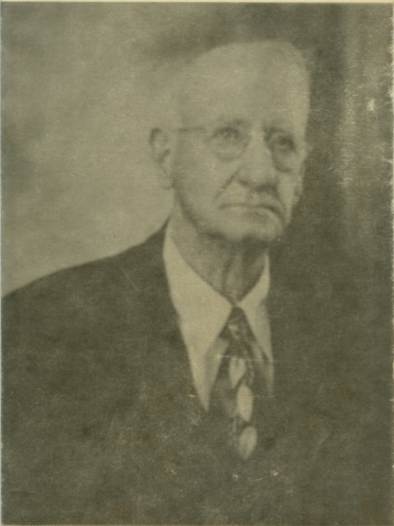
![]()
Location Of The Grave Of Joe H. and Mary Blue
J.H. & Mary Blue are buried in the small cemetery near the Morriston Church of Christ in Morriston, Arkansas. The directions to the grave are as follows:-From
Salem, AR (zip code 72576) to the Morriston Cemetery. Take HWY
62 East approximately 7 miles to the intersection of HWY 62 and
HWY 289. Turn RIGHT at the intersection. Take HWY 289
approximately 1 3/4 miles to Morriston Road. Turn RIGHT off HWY
289 onto Morriston Road. Morriston Road is paved for
approximately 1 1/2 miles and then turns to gravel. After
reaching the gravel, go approximately 3/10 mile. Turn RIGHT on
the first road you come to. (There are no road signs.) This
road forks right after you turn on to it. Stay LEFT. You will
see the cemetery on the RIGHT.
-Directions to Joe Blue's headstone: Stop right after entering the cemetery. His headstone is in
the tenth row of graves and it is the tenth headstone in that
row. (Parret, Oldfield, York, Goodson, Taylor, Taylor, Taylor,
Lewis, Lewis, MR. AND MRS. JOE BLUE, Blue)
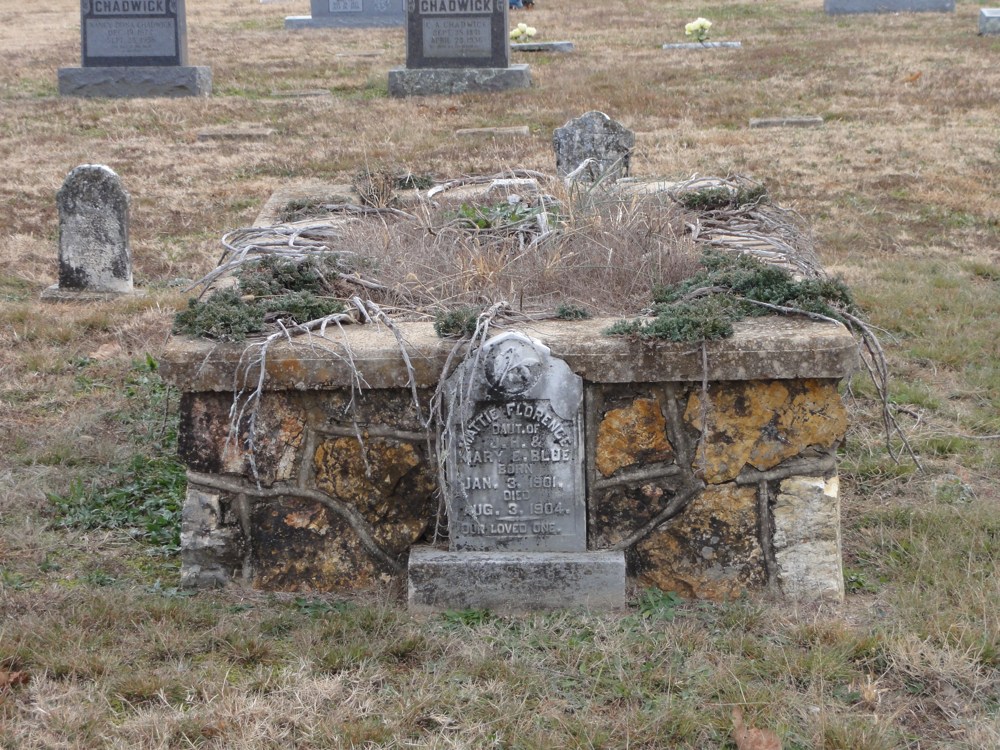
Mattie Florence
Daughter Of
J.H. & Mary E. Blue
Born
January 3, 1901
Died
August 3, 1904
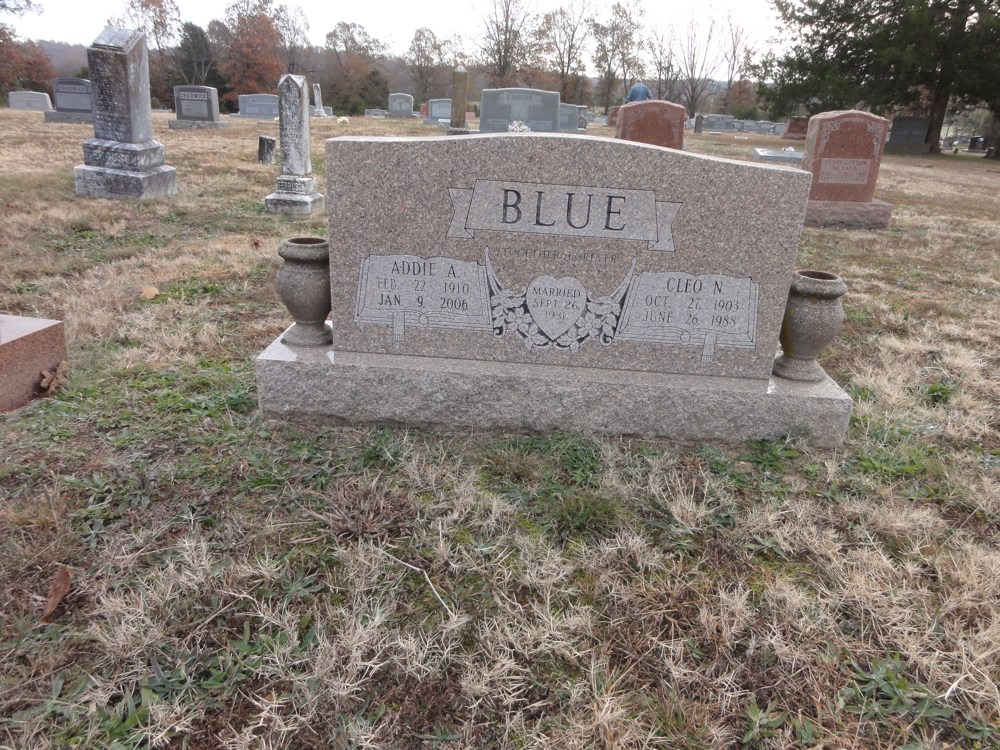
BLUE
Addie A. - February 22, 1910 - January 9, 2006
Cleo N. October 27, 1903 - June 26, 1988
Married September 26, 1931
Together Forever
Cleo was the son of Joe & Mary Blue.
He was also a Gospel Preacher like his father.
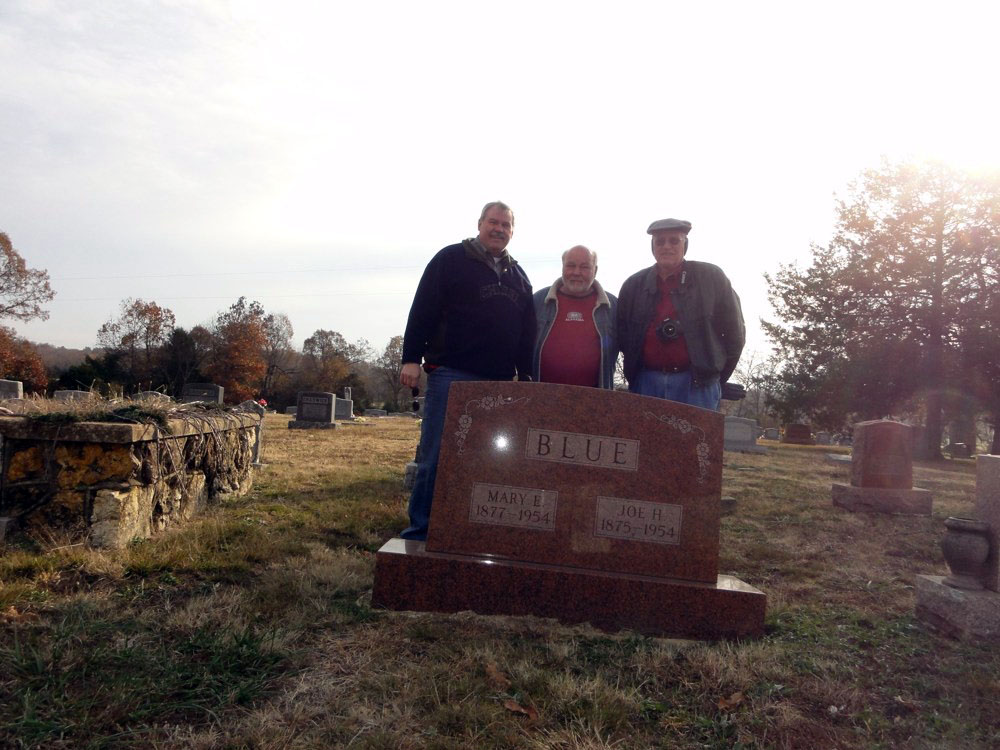
LtoR - Scott D. Harp, C. Wayne Kilpatrick, Tom L. Childers
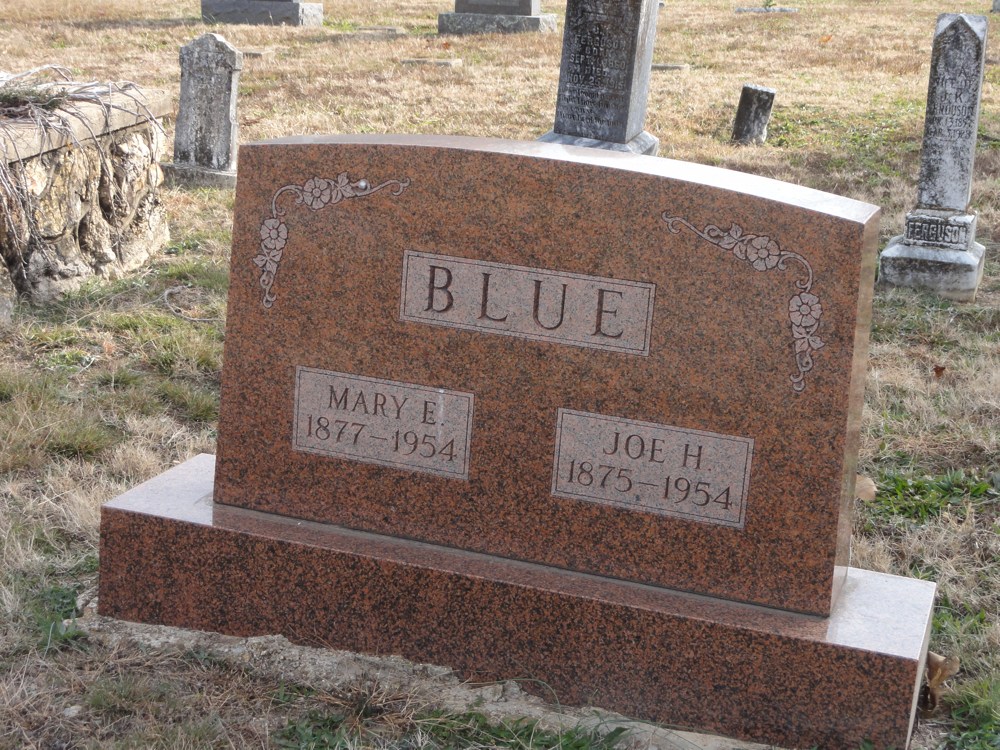
BLUE
Mary E. 1877-1954
Joe H. 1875 - 1954
![]()
Webmaster's Note: In 2003 attempts were made to locate the final resting place of Joe H. and Mary Blue. After contacting Christians in the Salem, Arkansas area, the name of Wilma Langston was given to me. I contacted her and requested her help to get information about the grave location. She was very accommodative in helping gather the things I needed. In February, 2004 a package arrived from her with a wonderful letter and couple pictures you see on this site. In her letter she referred to Brother Blue as "Uncle" Joe Blue. She further added that he and "Aunt Mary were two good people," and that Uncle Joe Blue had married she and her husband Russell Langston 53 years previous. It was a delightful letter, and I felt honored to receive the information you are enjoying on this site. In August, 2004 I received an email from the Langston's grand daughter, Tania Langston Wallace offering to help with acquiring photos of the grave and directions to the gravesite. She quickly came to my rescue and provided the shots of the grave and directions that appear on this site. Many thanks to the Langston family for helping to make this site possible. Sister Langston informed me that the little church at Morriston had dwindled in size to about 12 to 15 members. Such has happened to so many rural congregations over the years. Pray that the Lord of harvest will send forth reapers into the field.
The Morriston Church
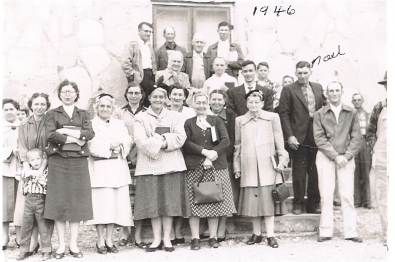
Church of Christ At Morriston,
Arkansas In 1946
Wilma Langston Is The Lady On The Left Holding The Little Boy
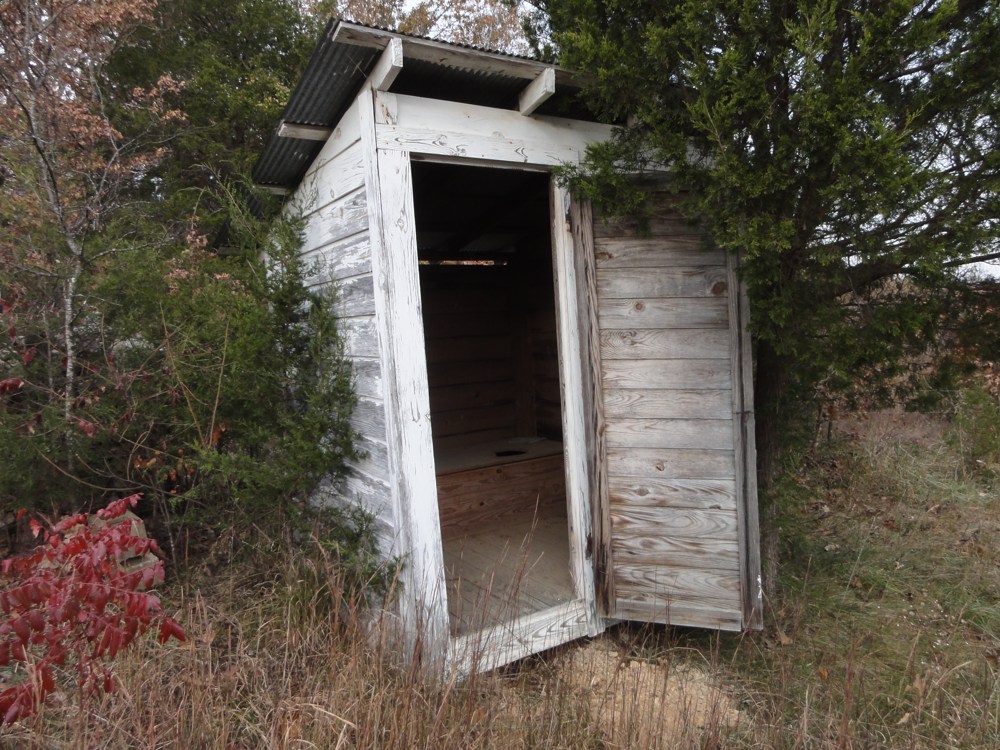
Old Outhouse Behind The Building
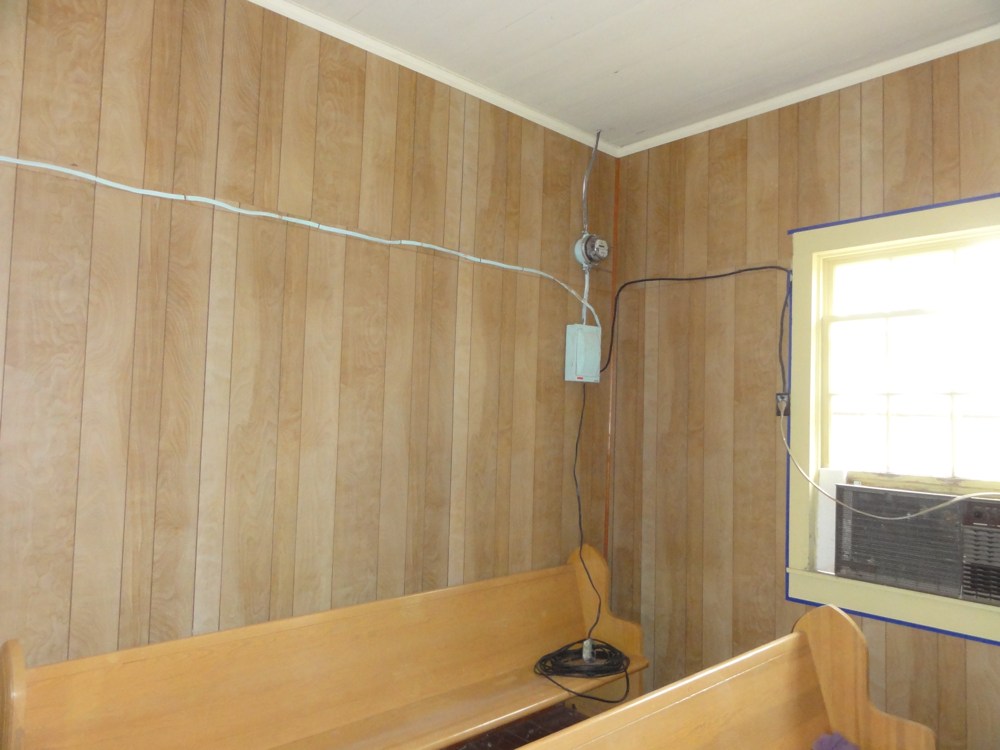
Note the meter for the electricity is on the inside of the building - showing the building was never locked and was not while we were there.
![]()
Photos Taken 11.14.2014
Webpage Updated 02.25.2015
Courtesy of Scott Harp
www.TheRestorationMovement.com
*Special thanks to Tom L. Childers and Charlie Wayne Kilpatrick for assisting in the burial location. They, along with your web editor, took a trip into northern Arkansas to find the graves of gospel preachers of yesteryear in November, 2014. We traveled together three days and located the final resting places of nearly forty preachers and their families. It was a great trip. Many of the personalities we researched were chronicled in Boyd E. Morgan's book, Arkansas Angels, or later in Dr. Michael L. Wilson's book, Arkansas Christians: A History of the Restoration Movement in Randolph County, 1800-1995.
![]()
